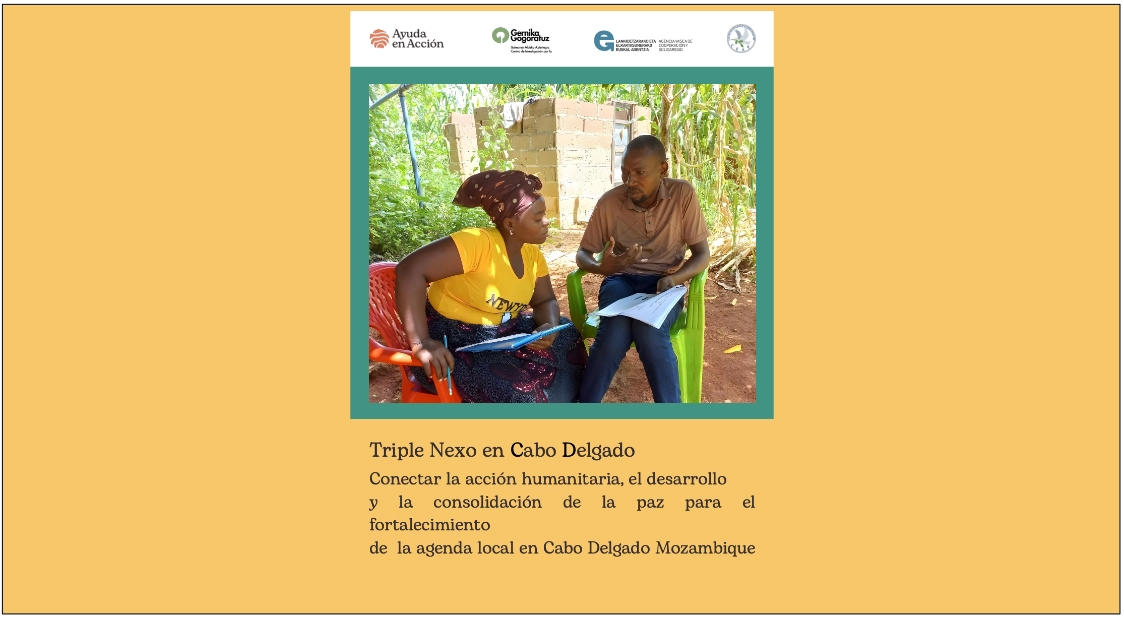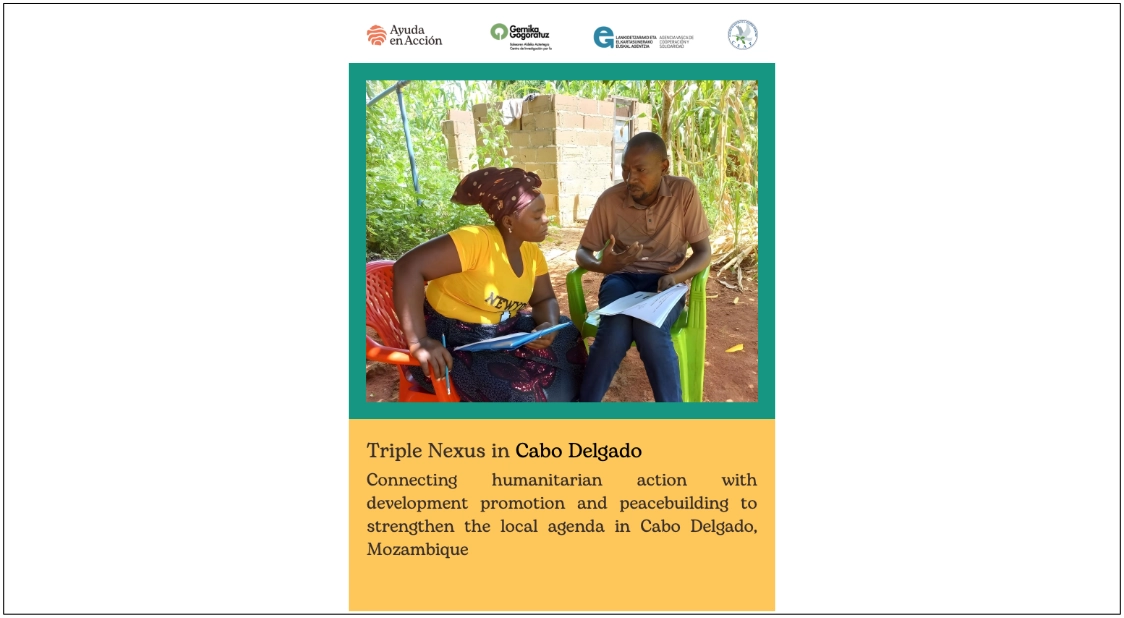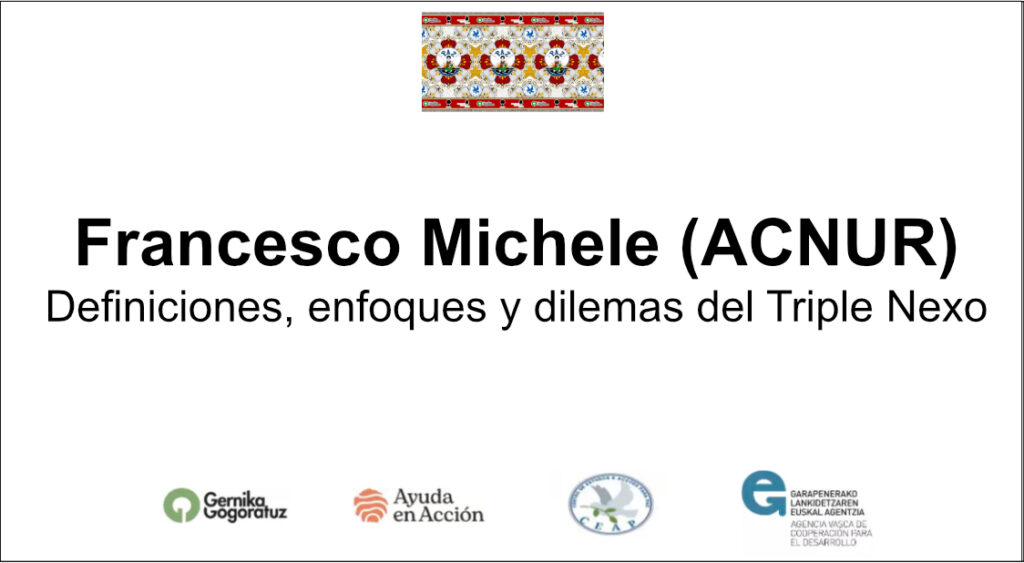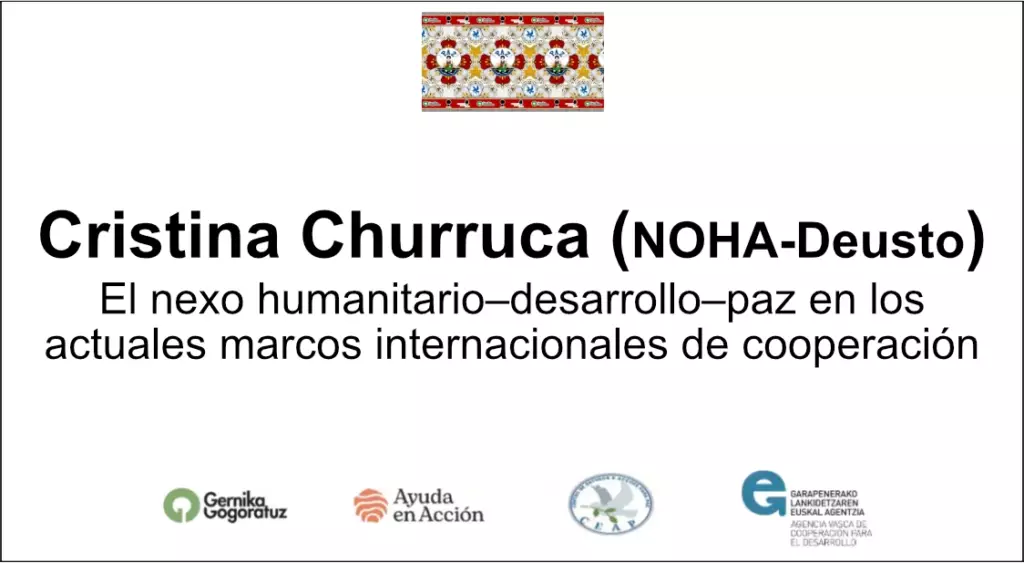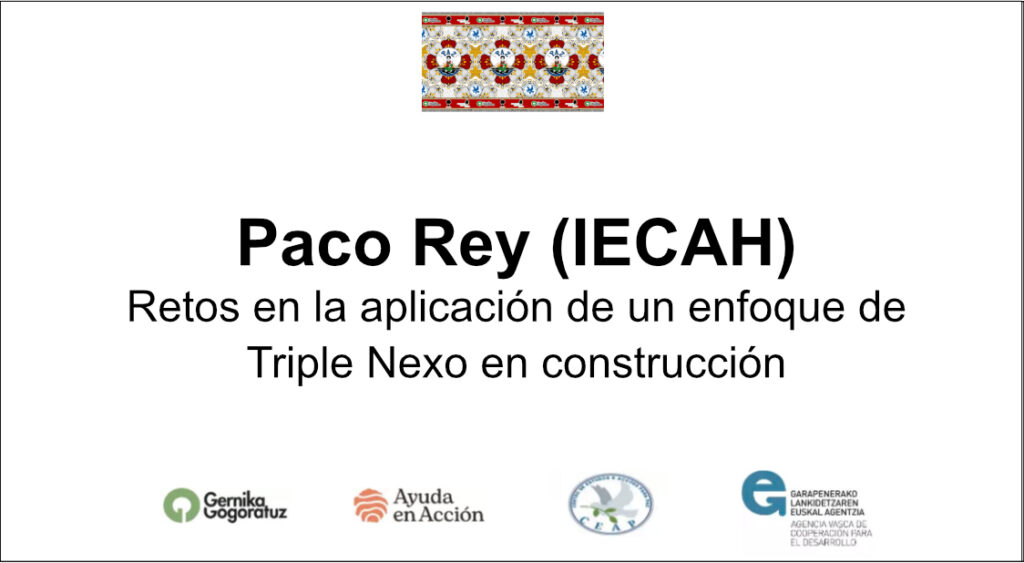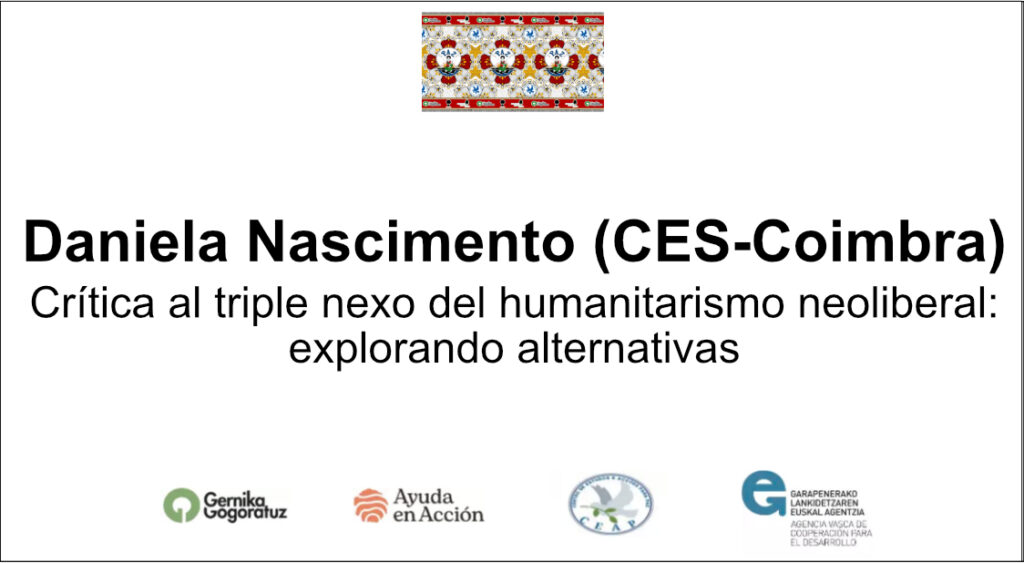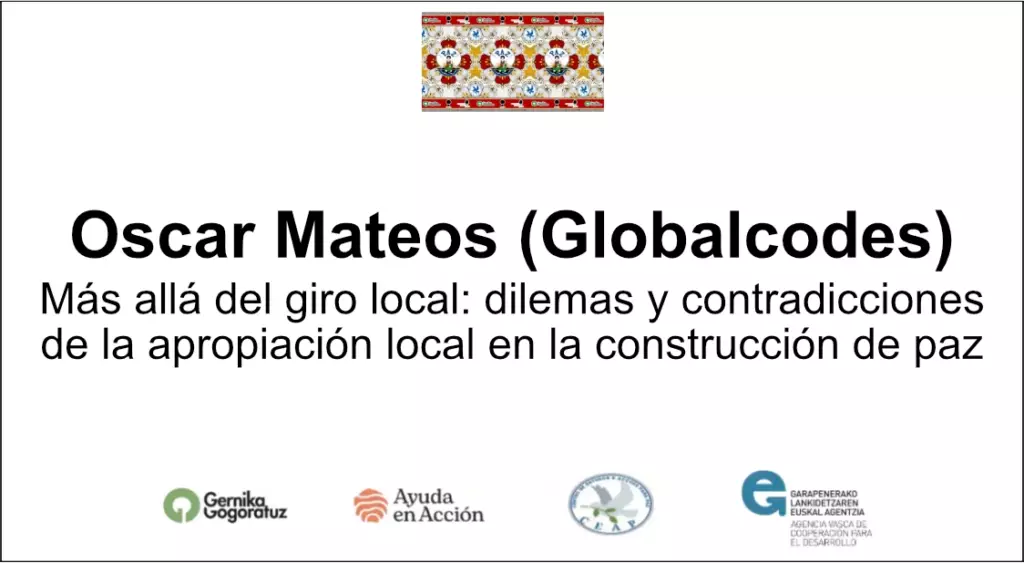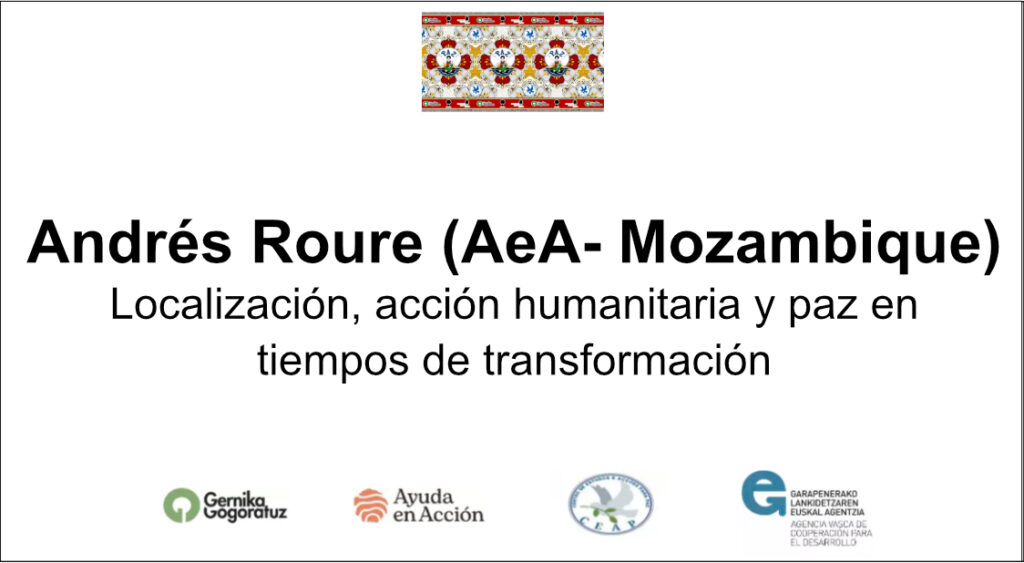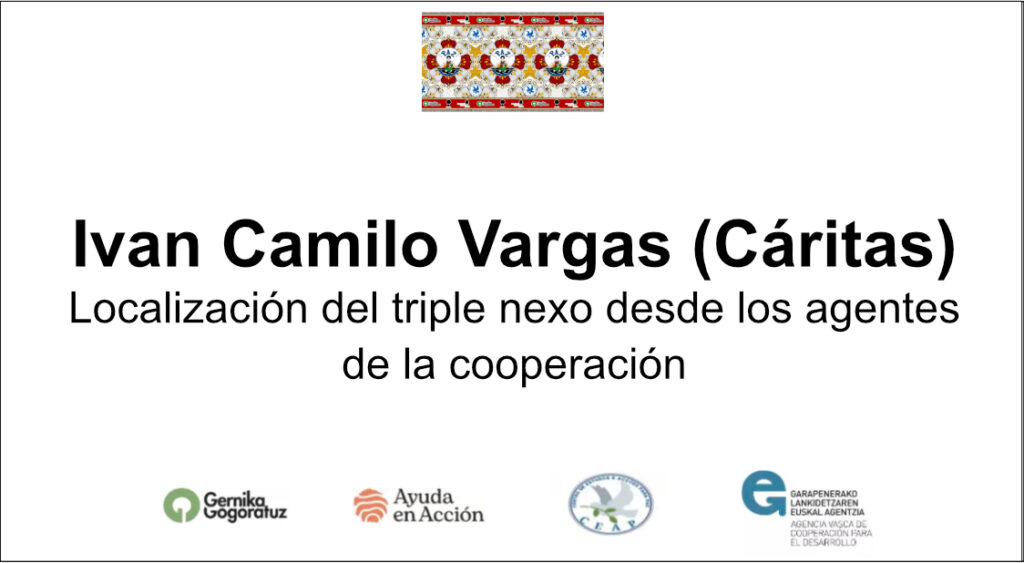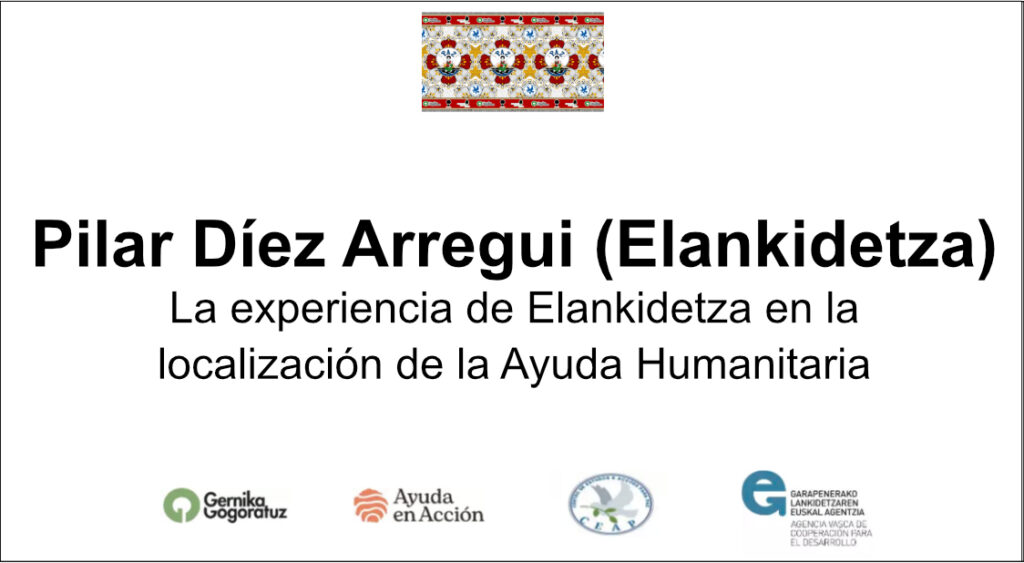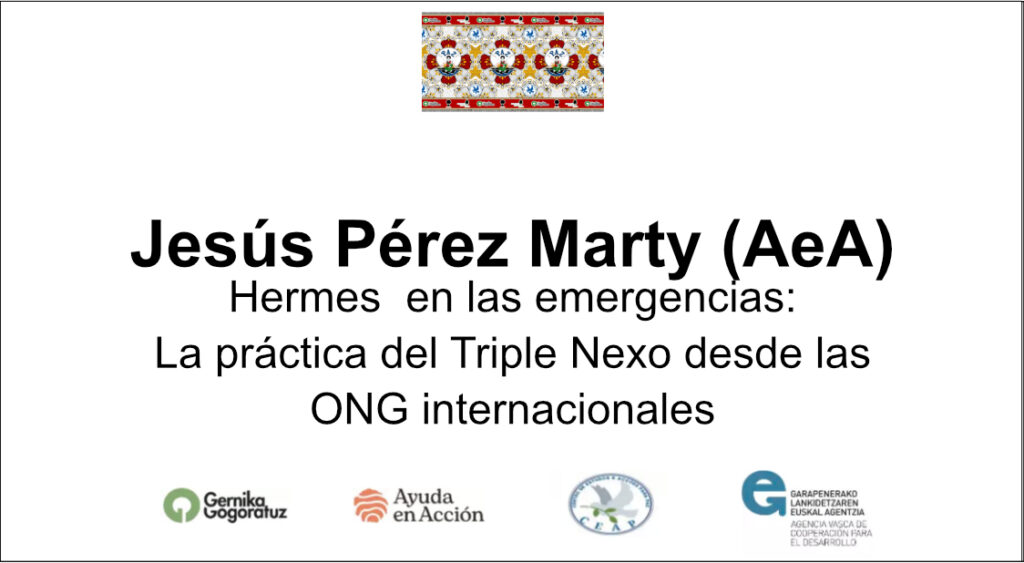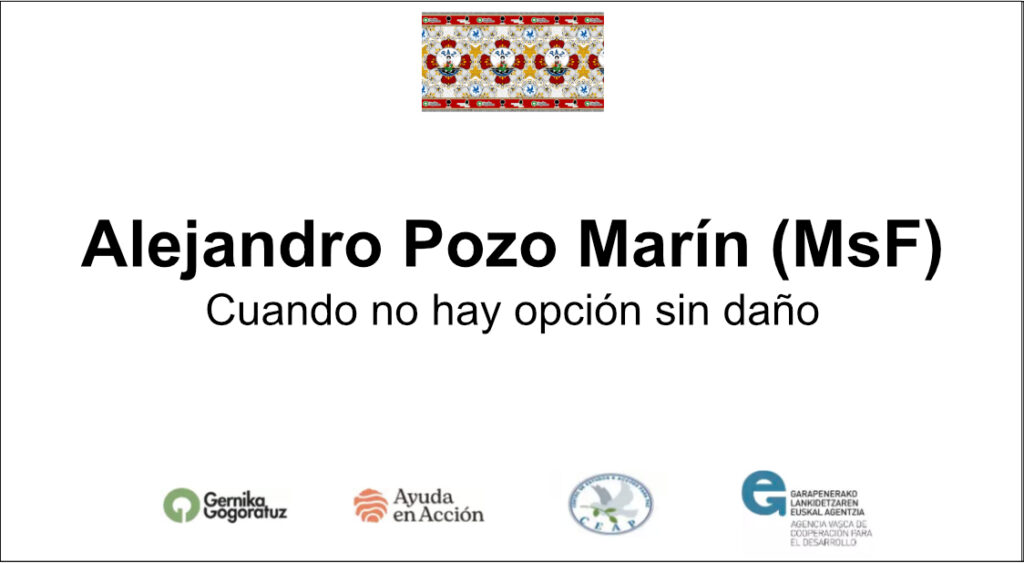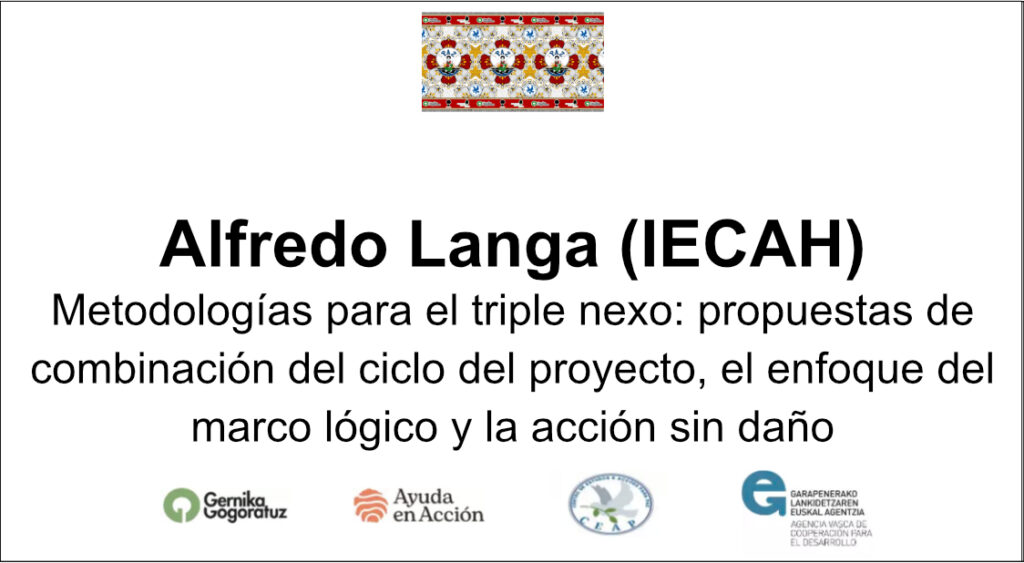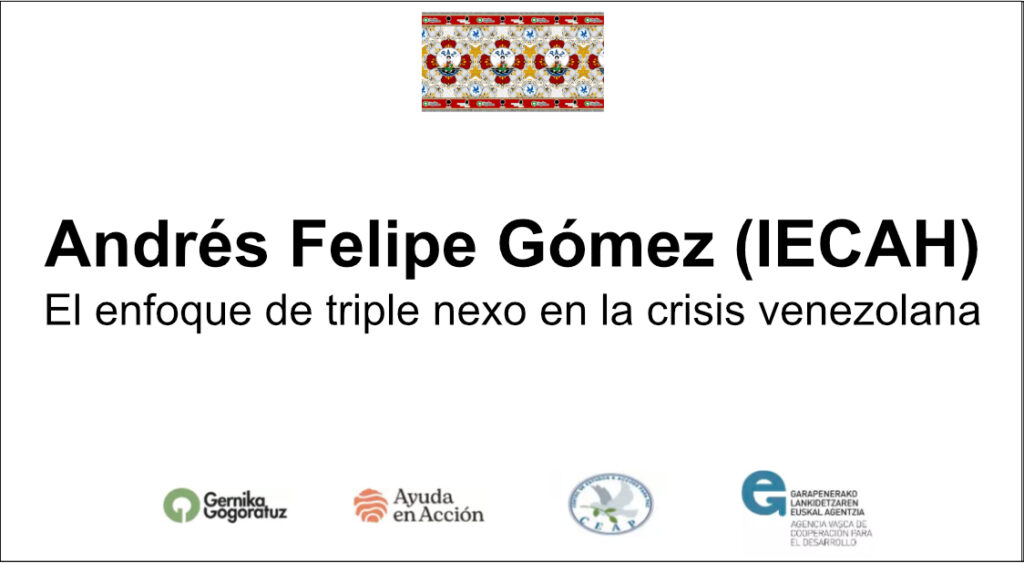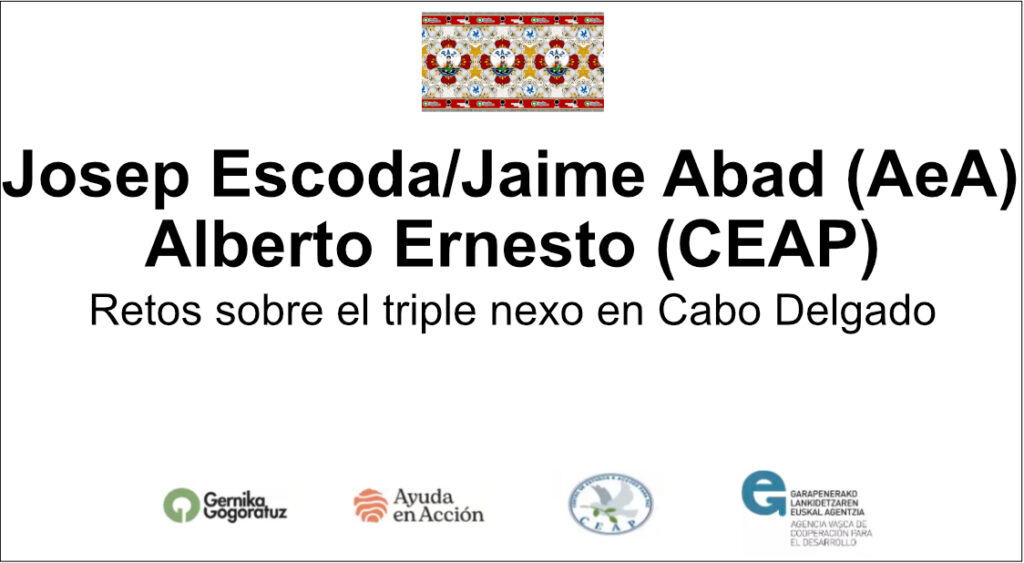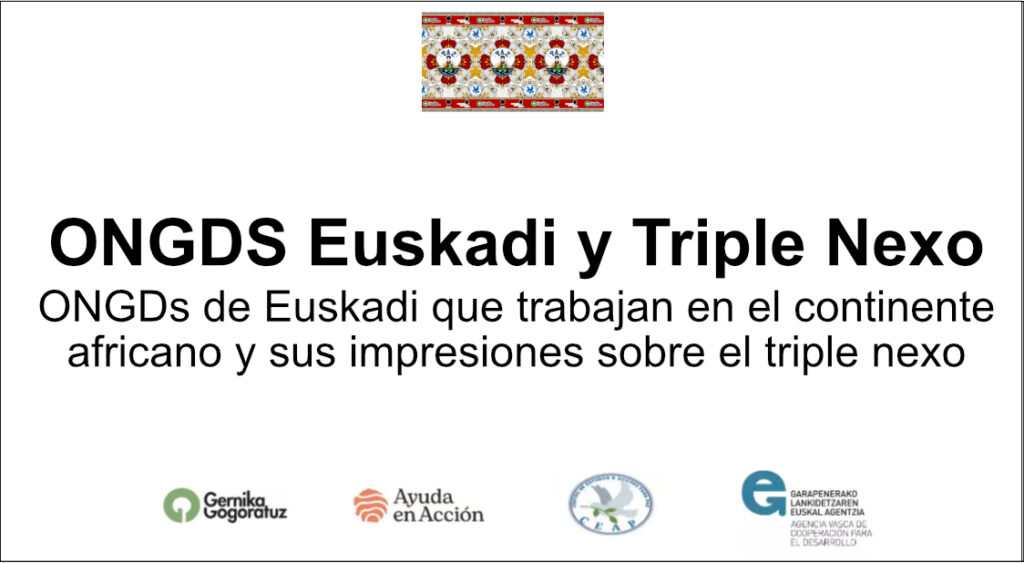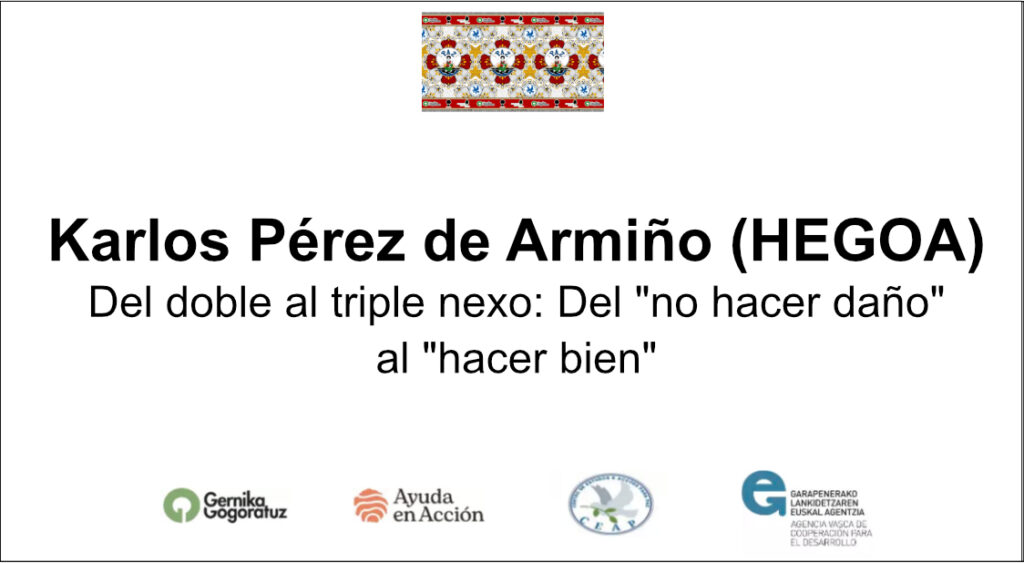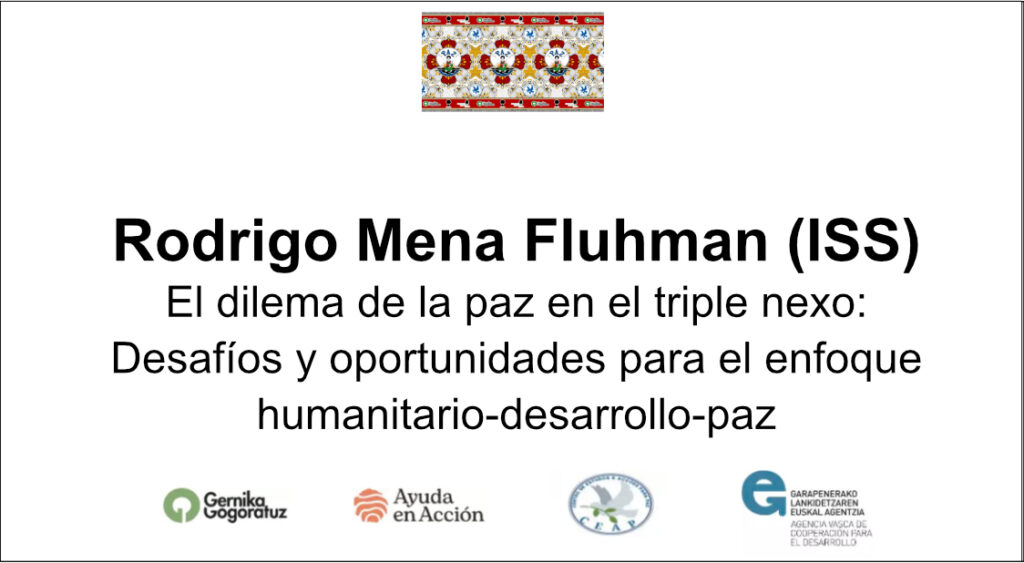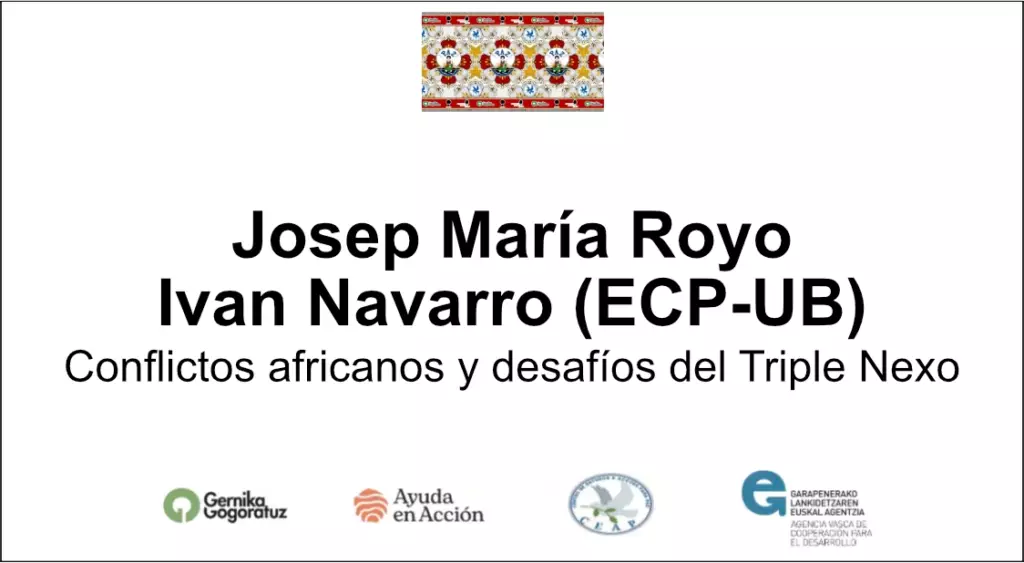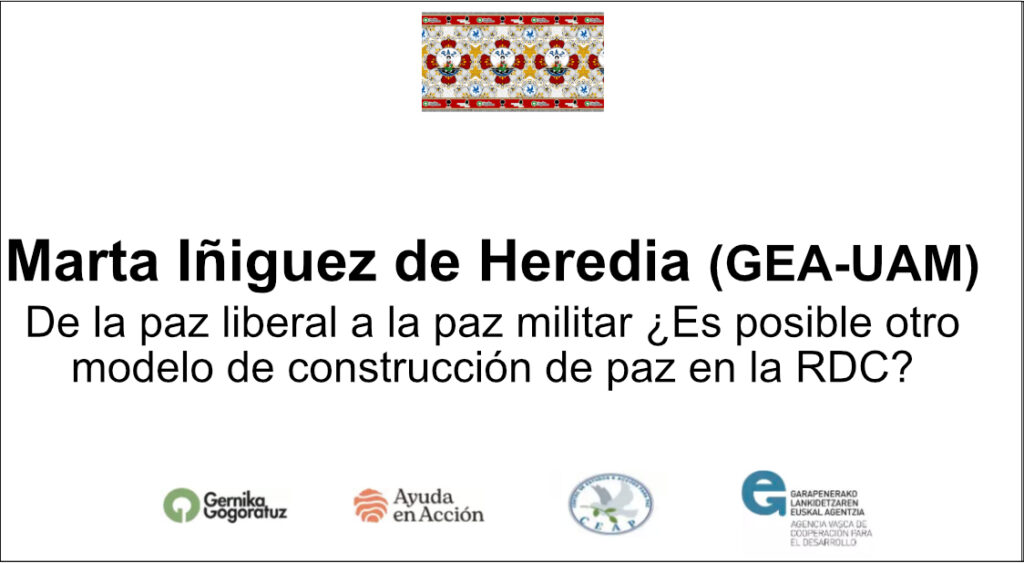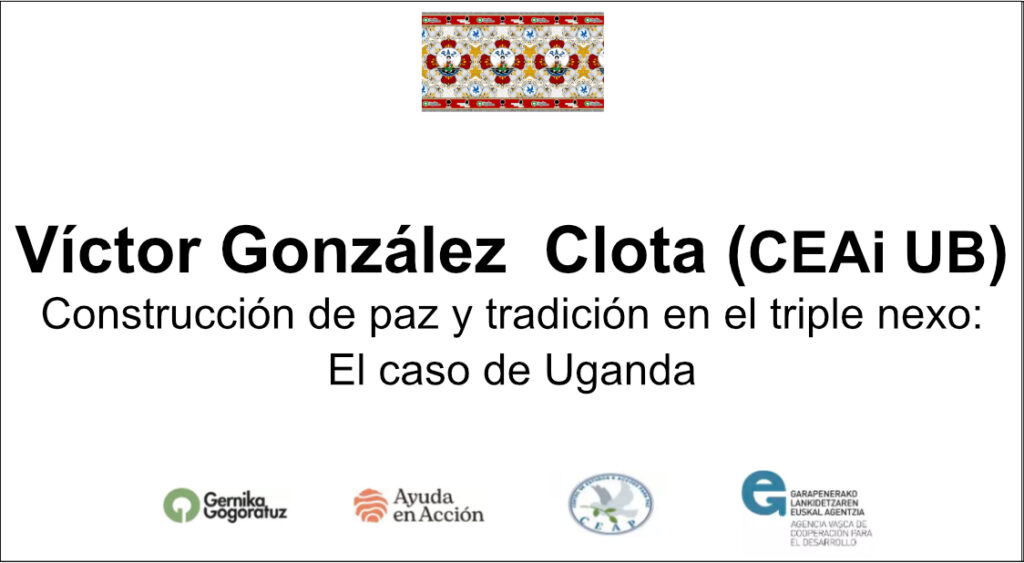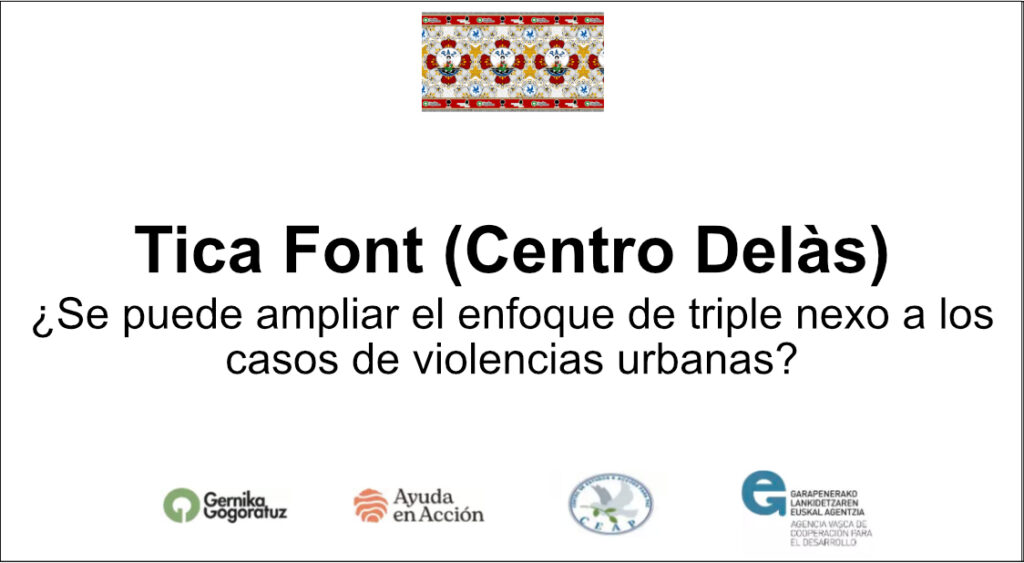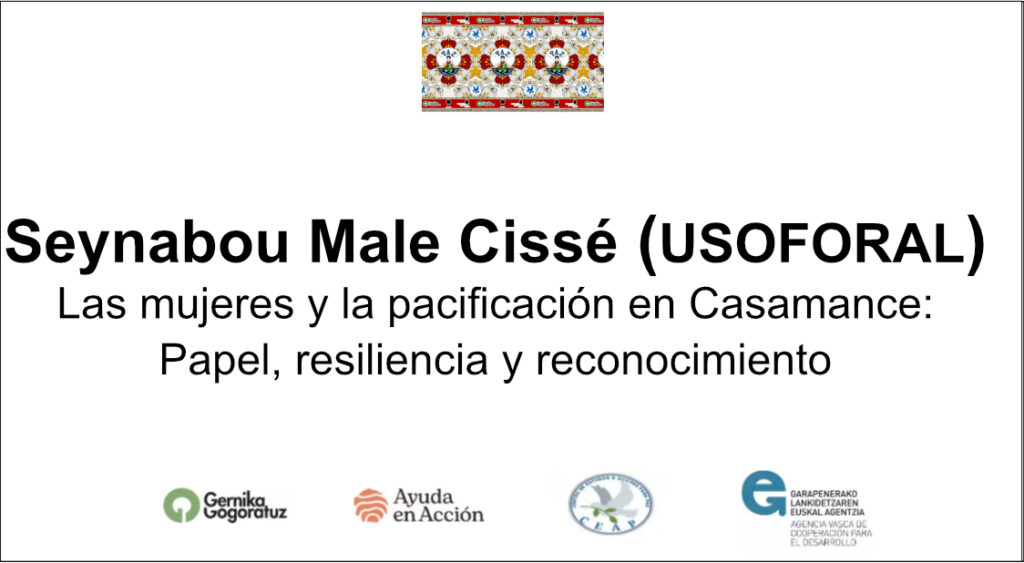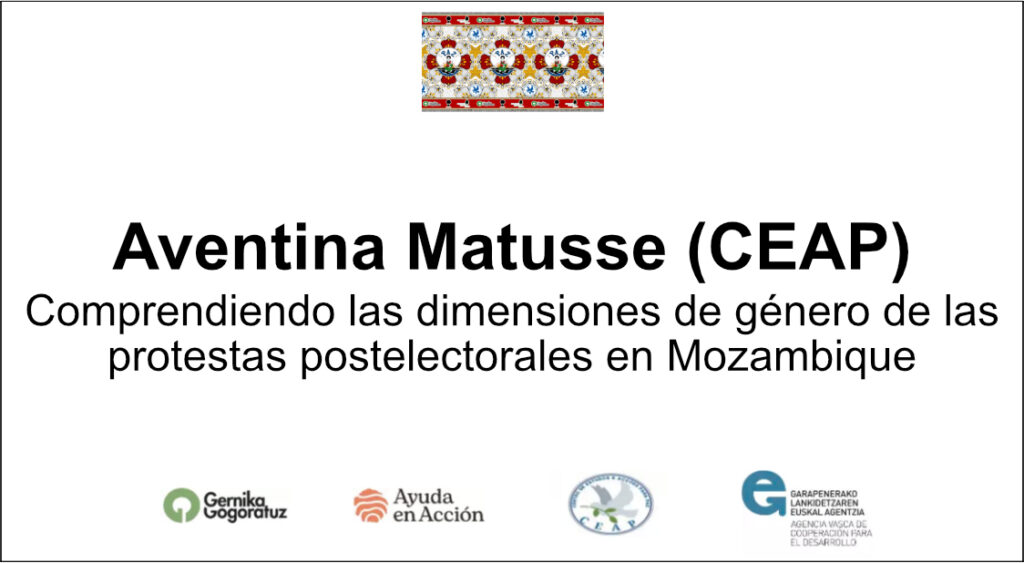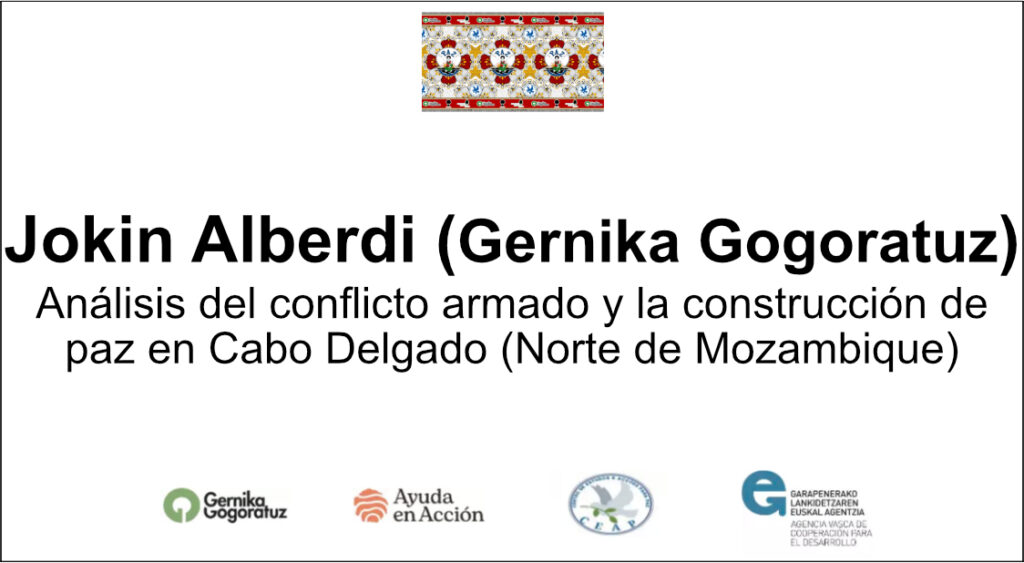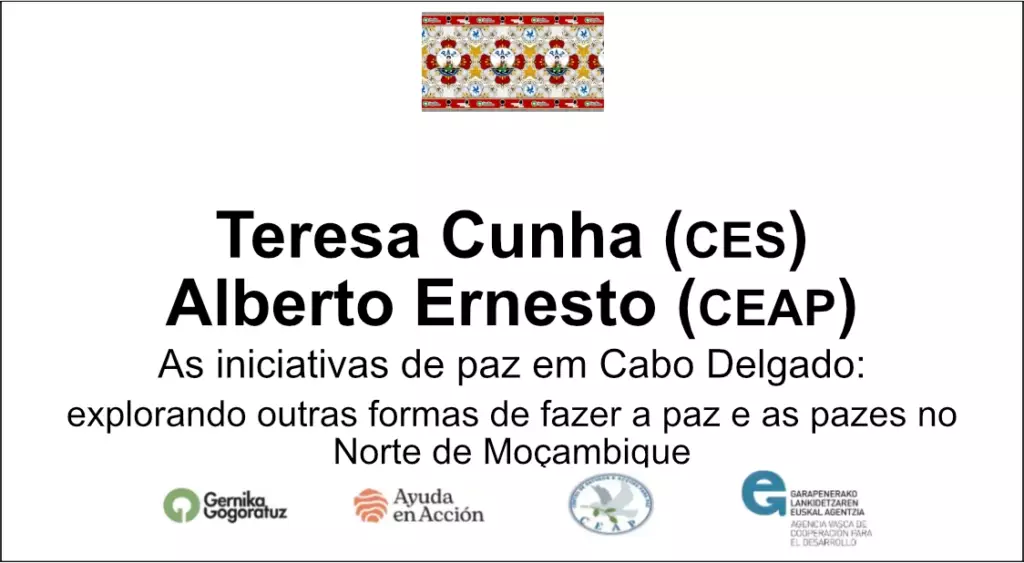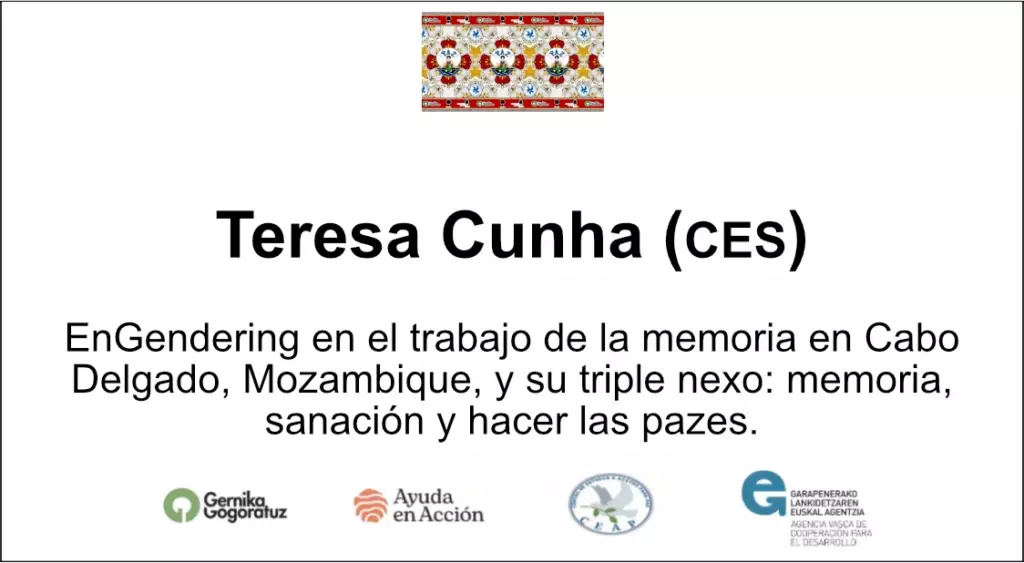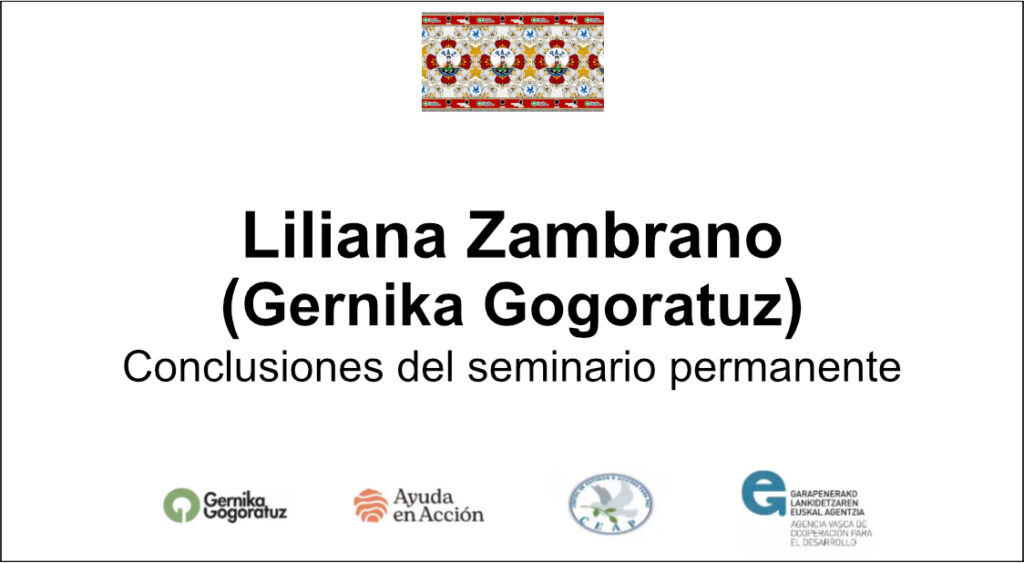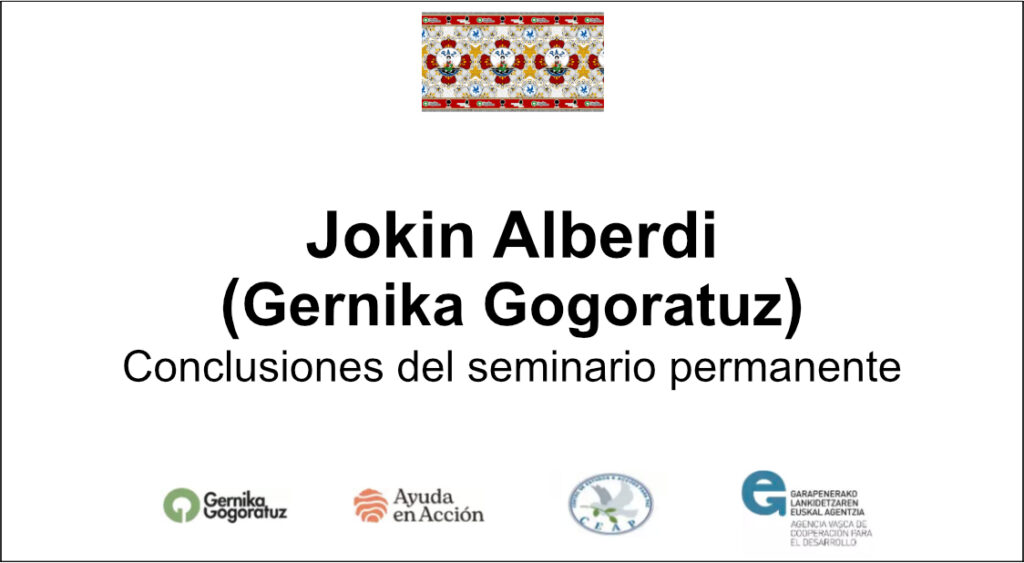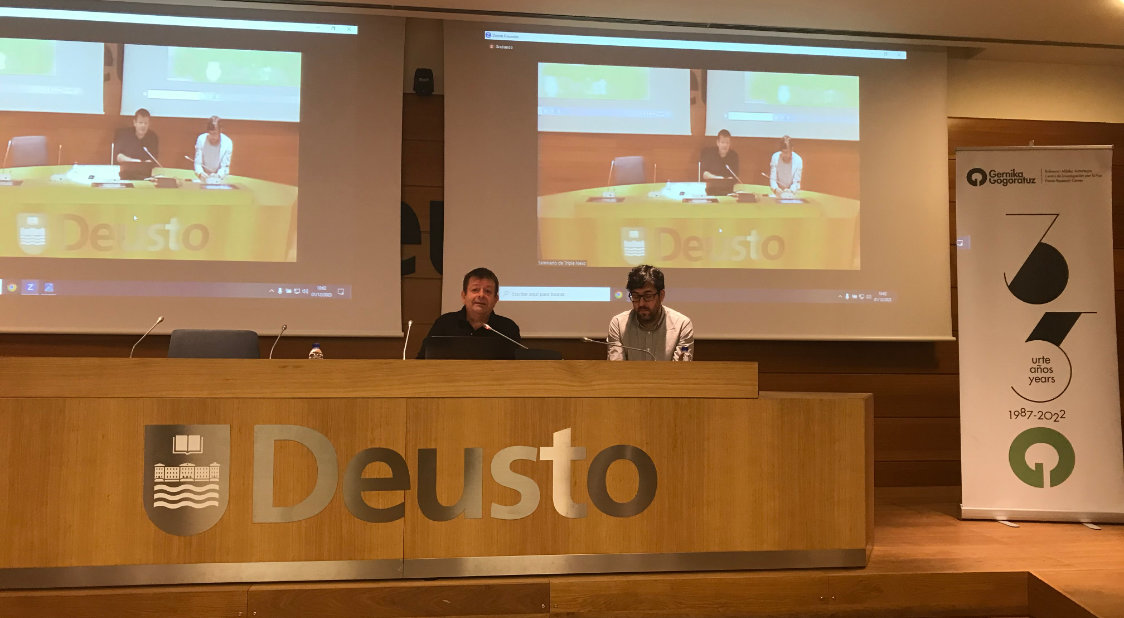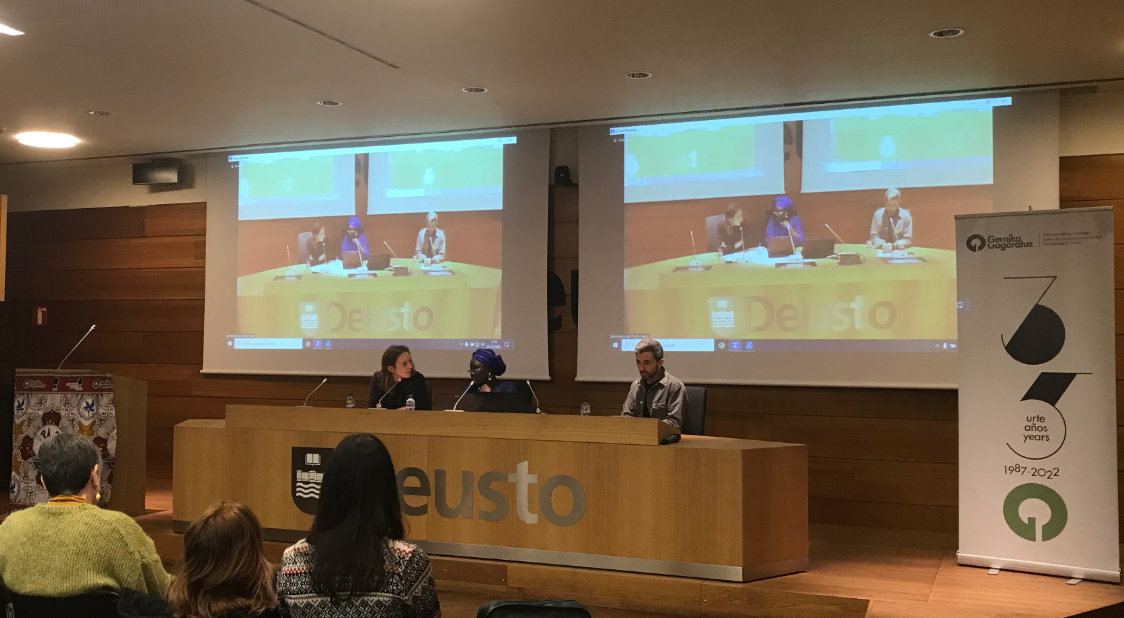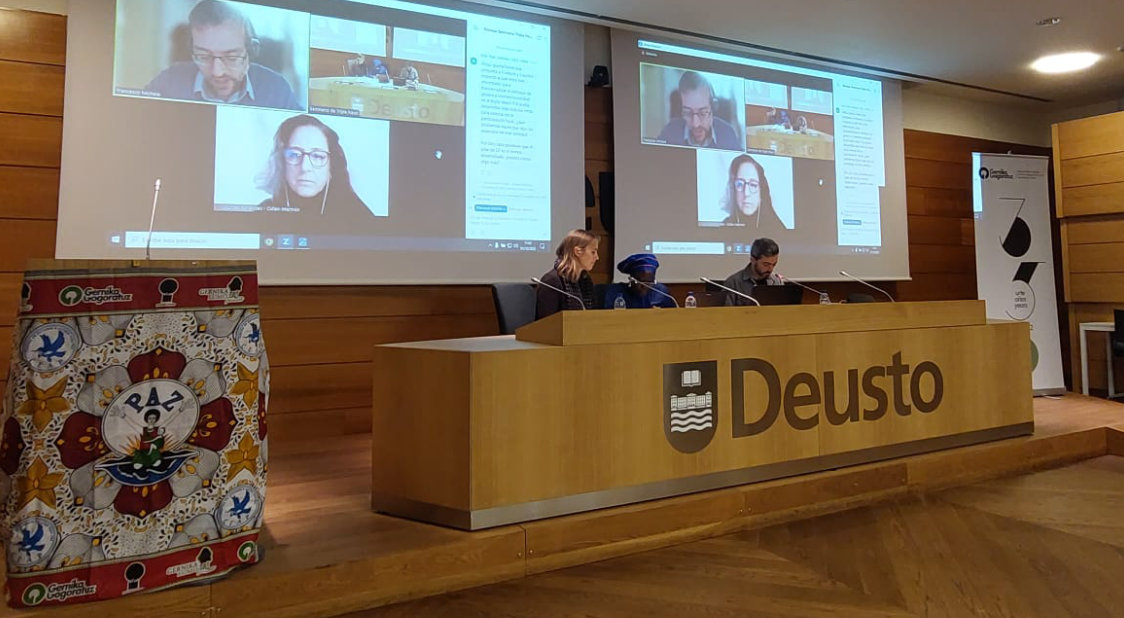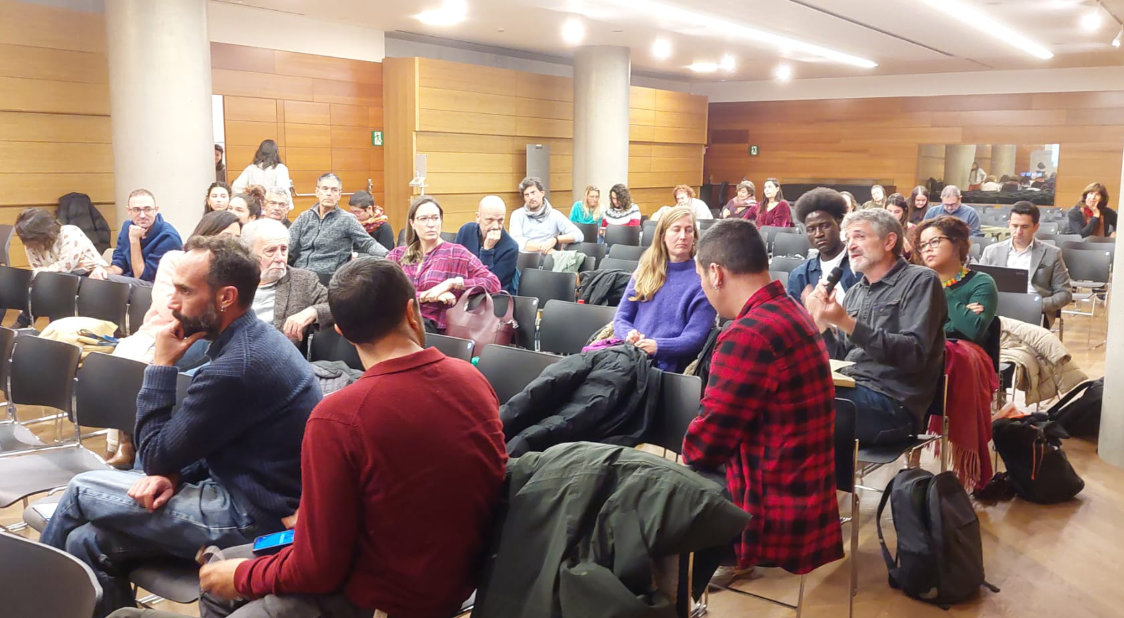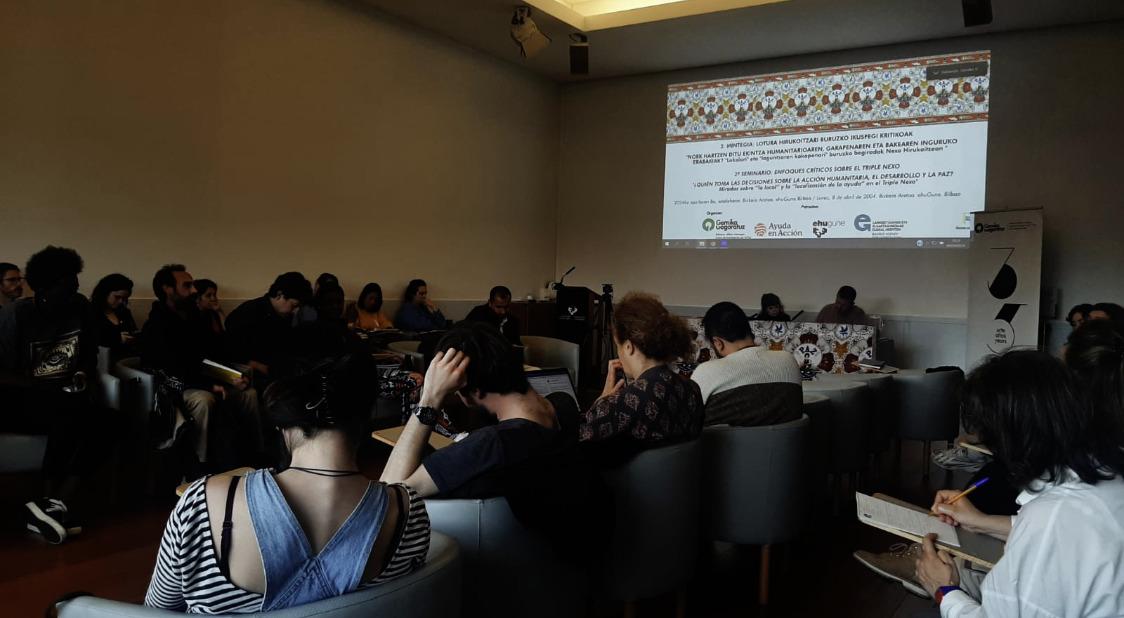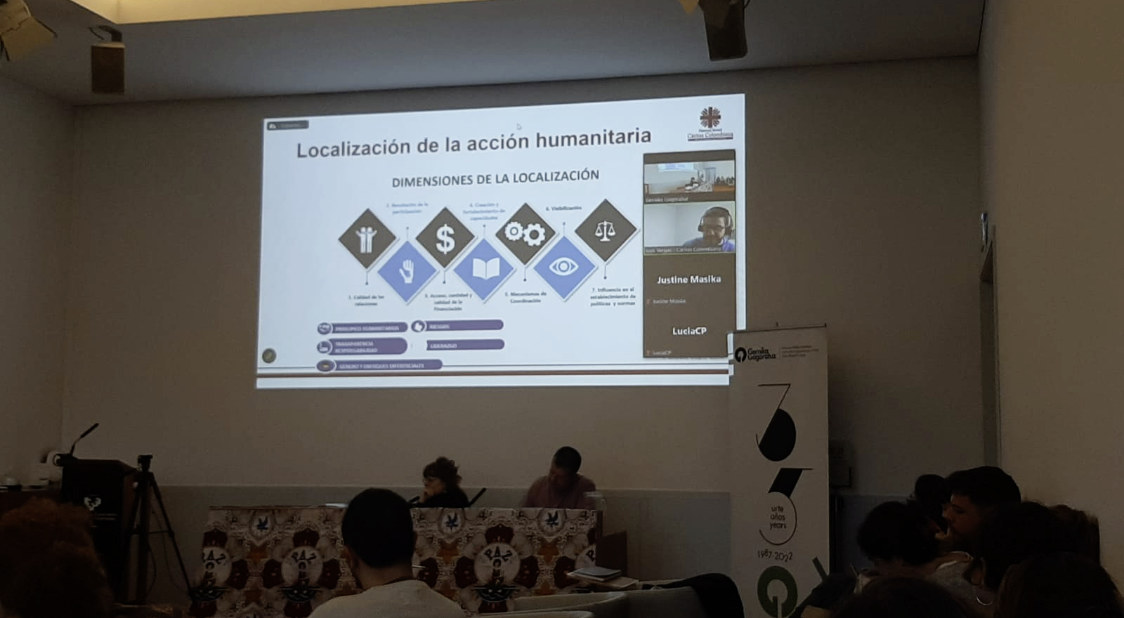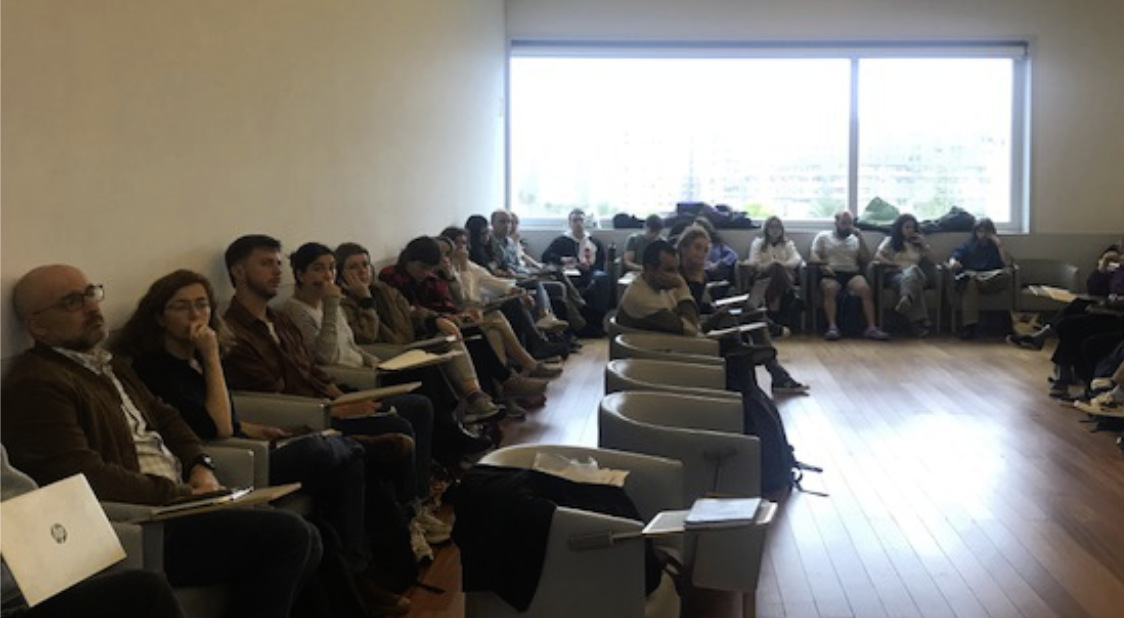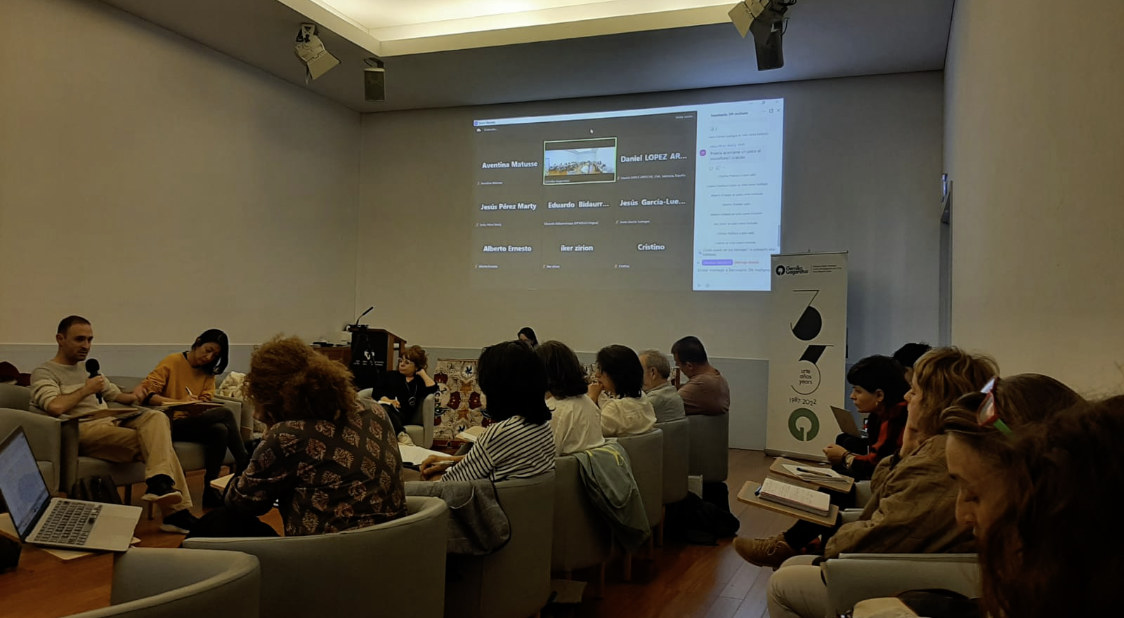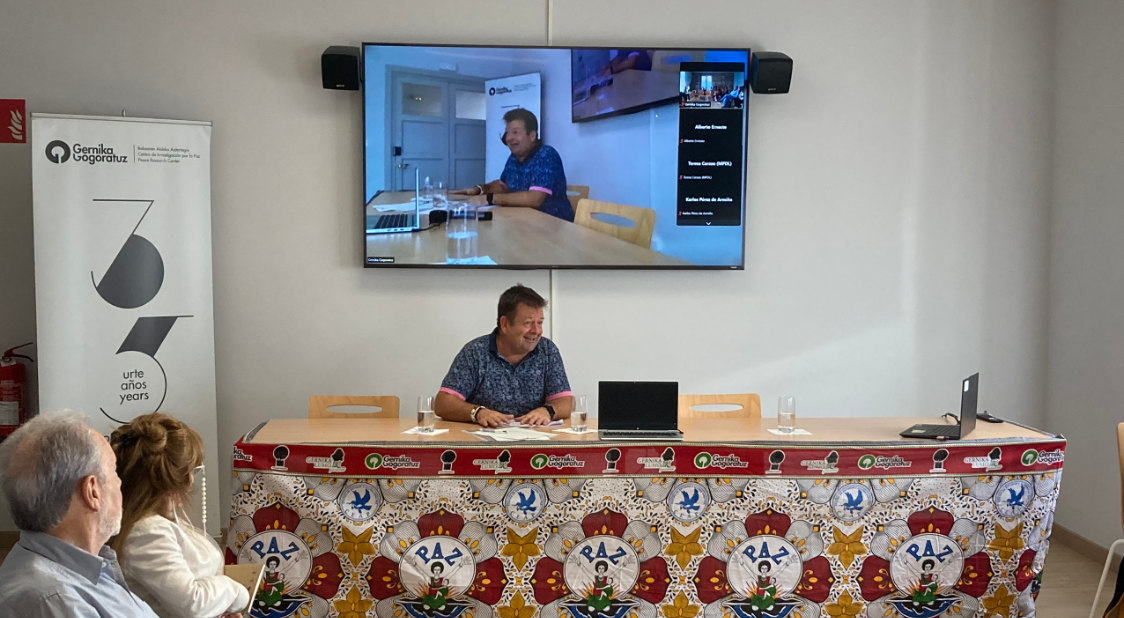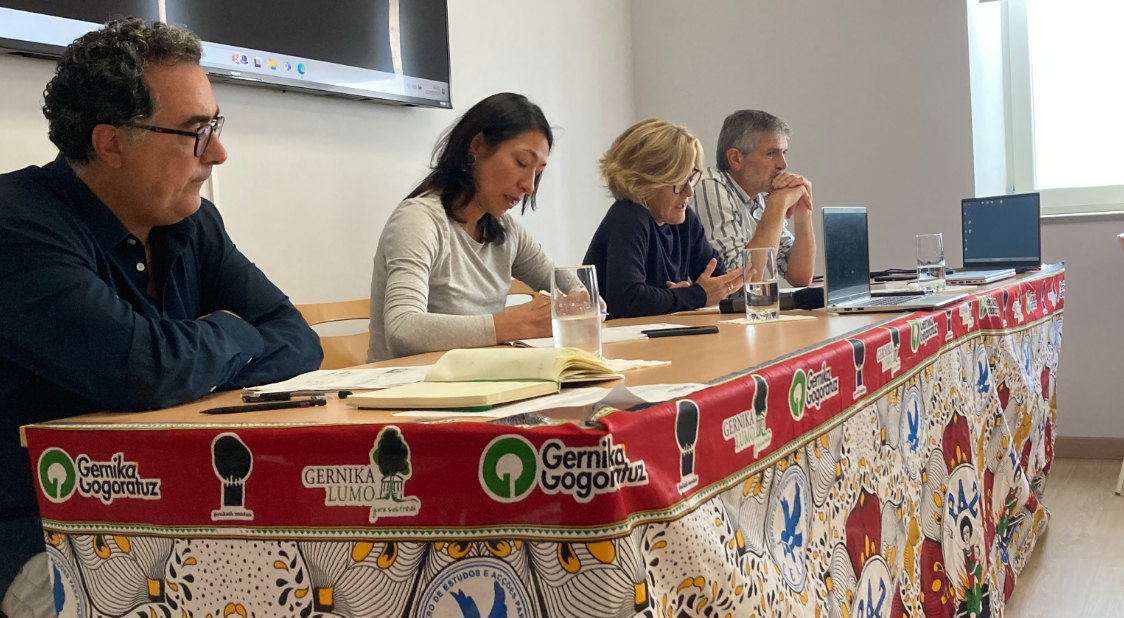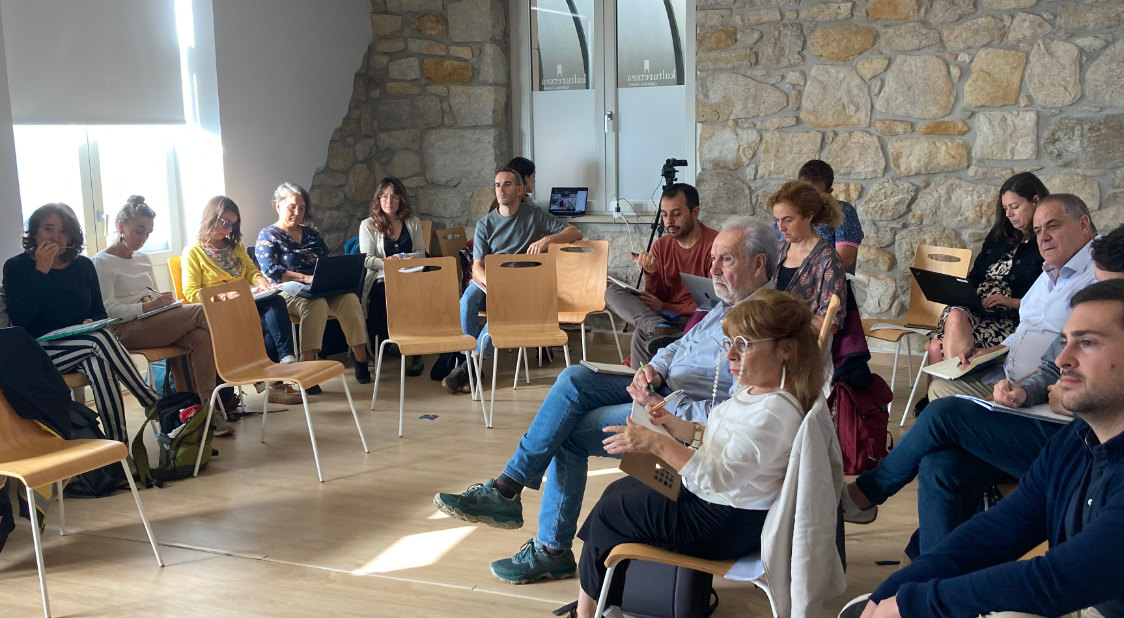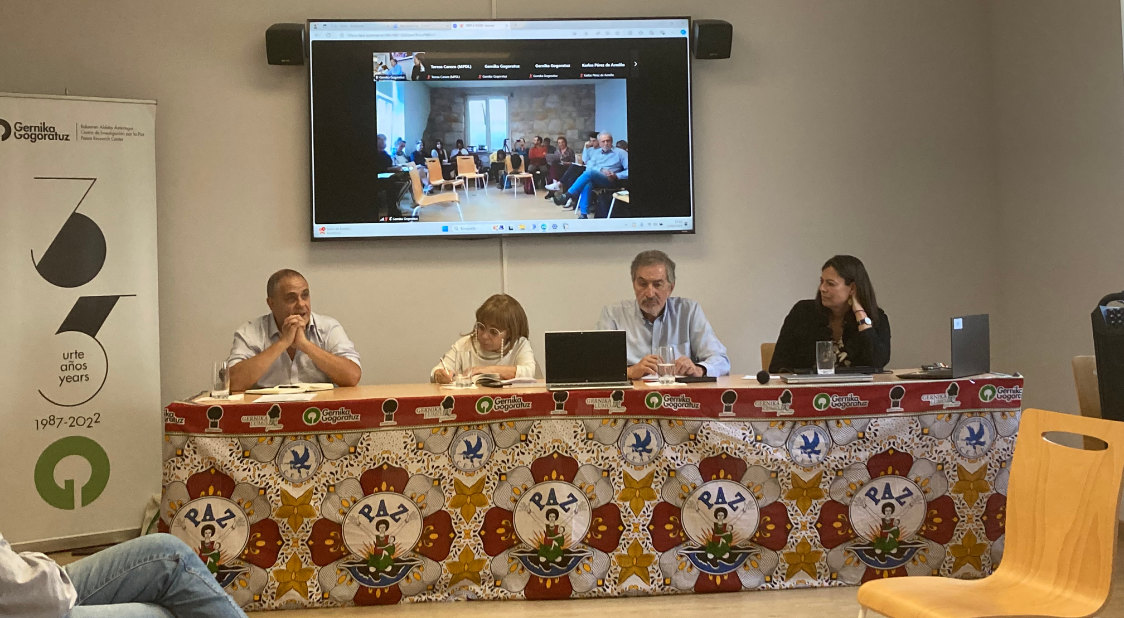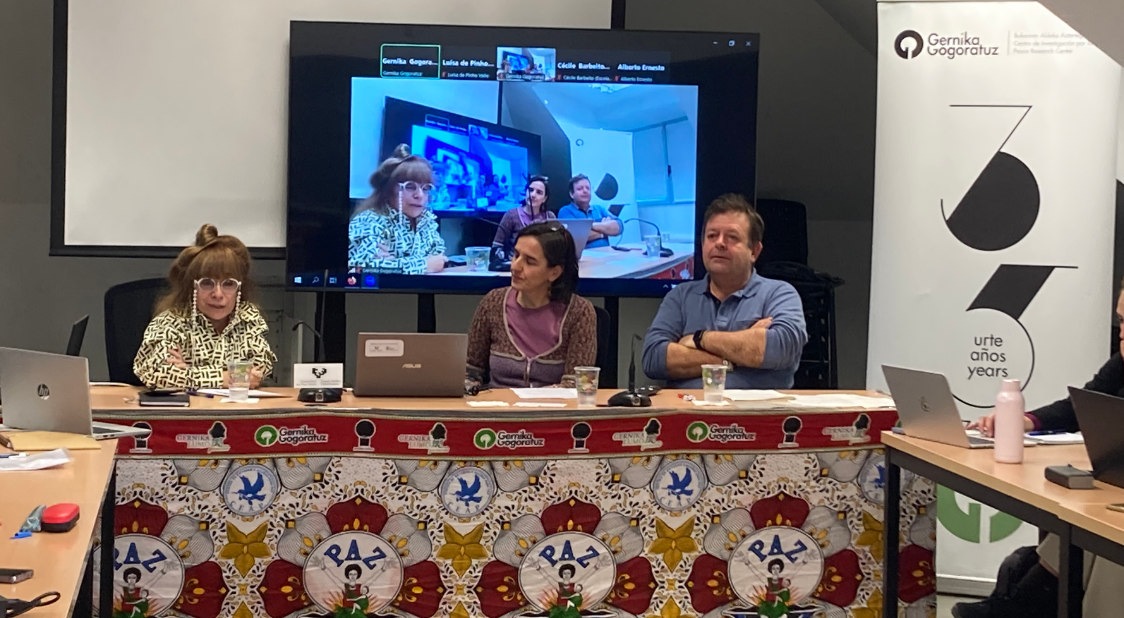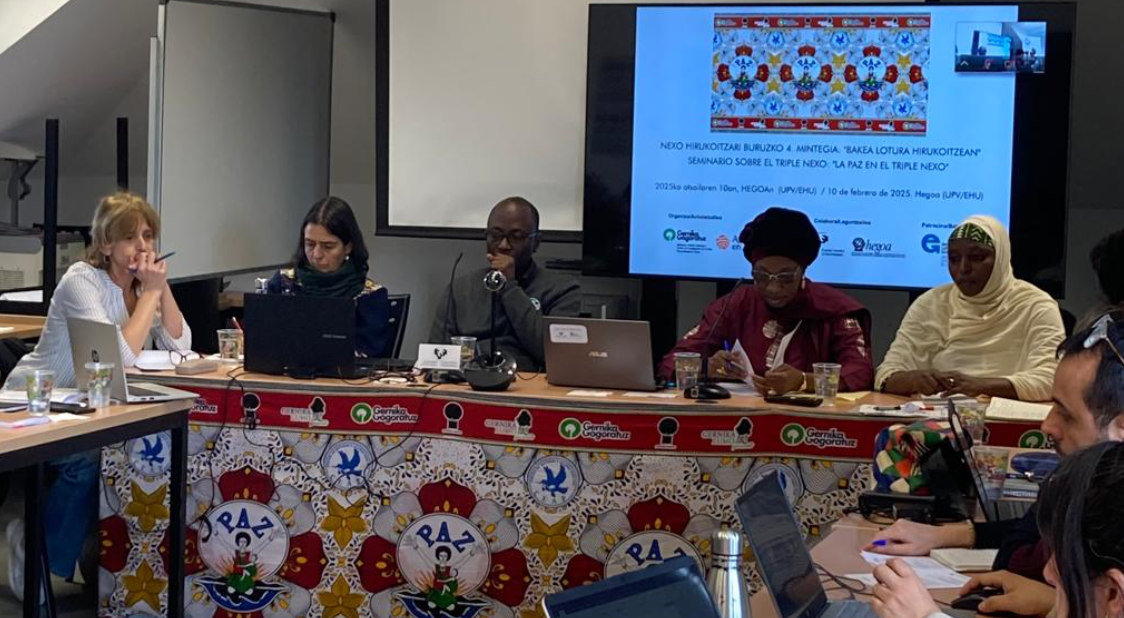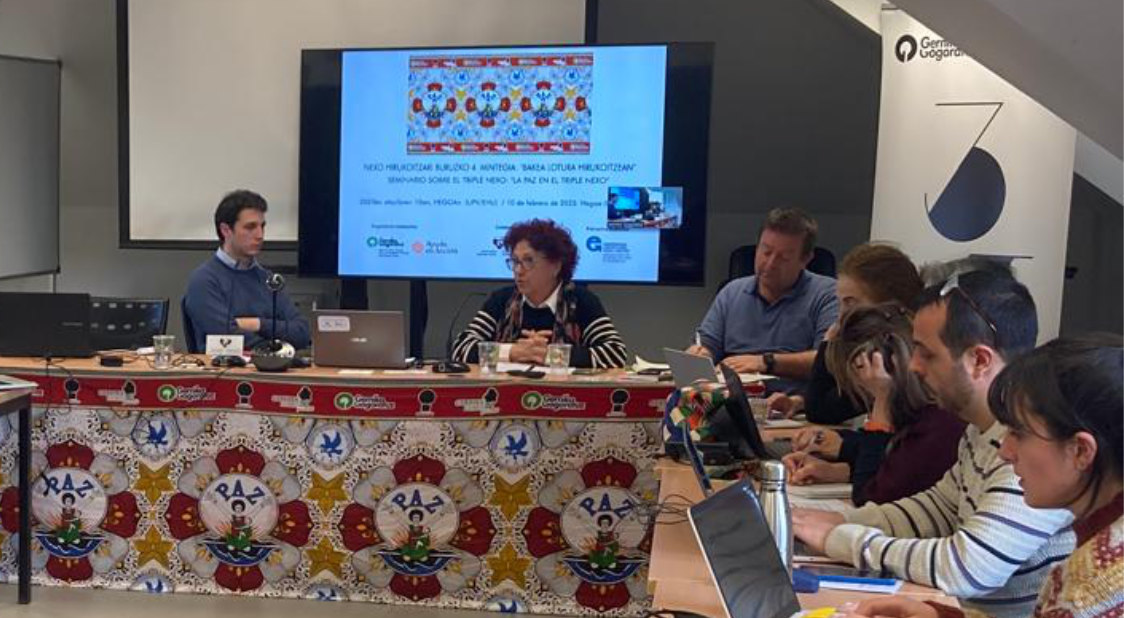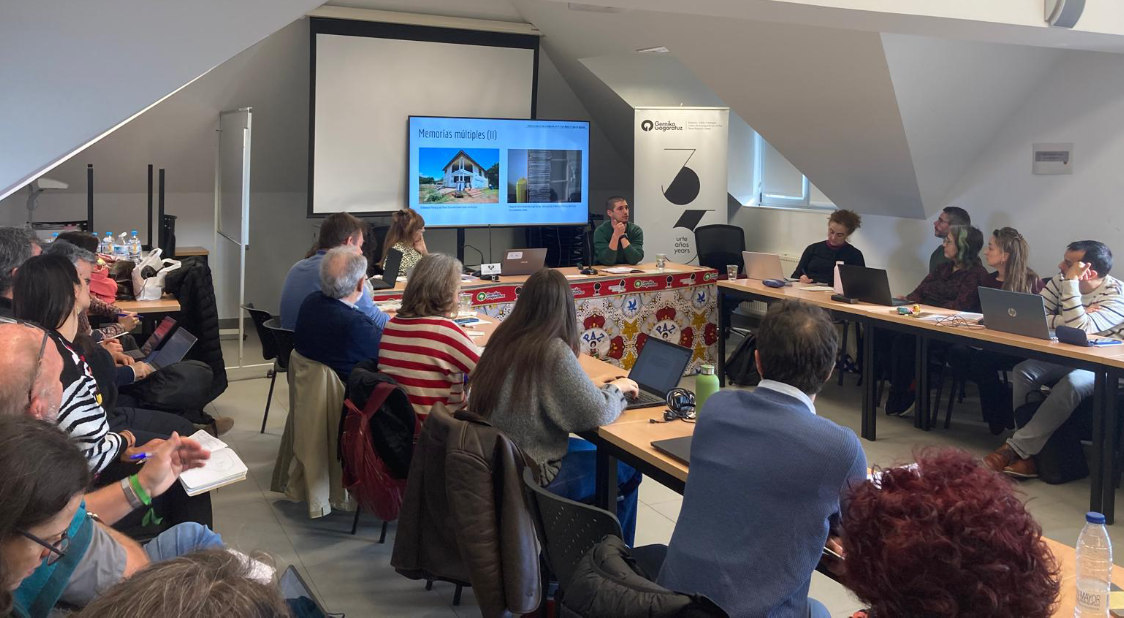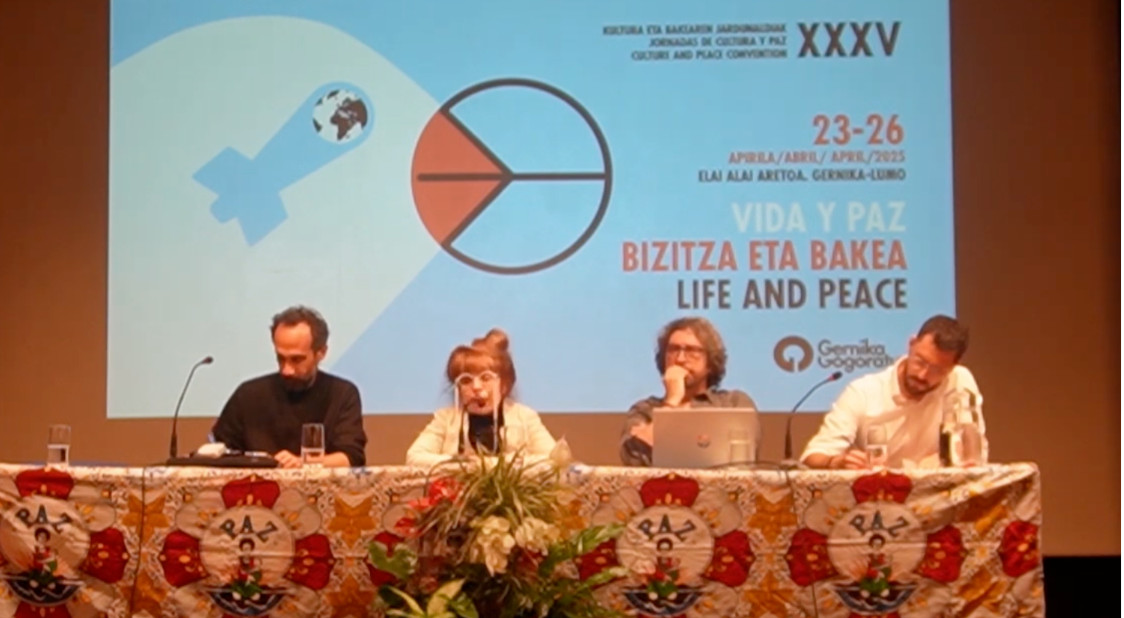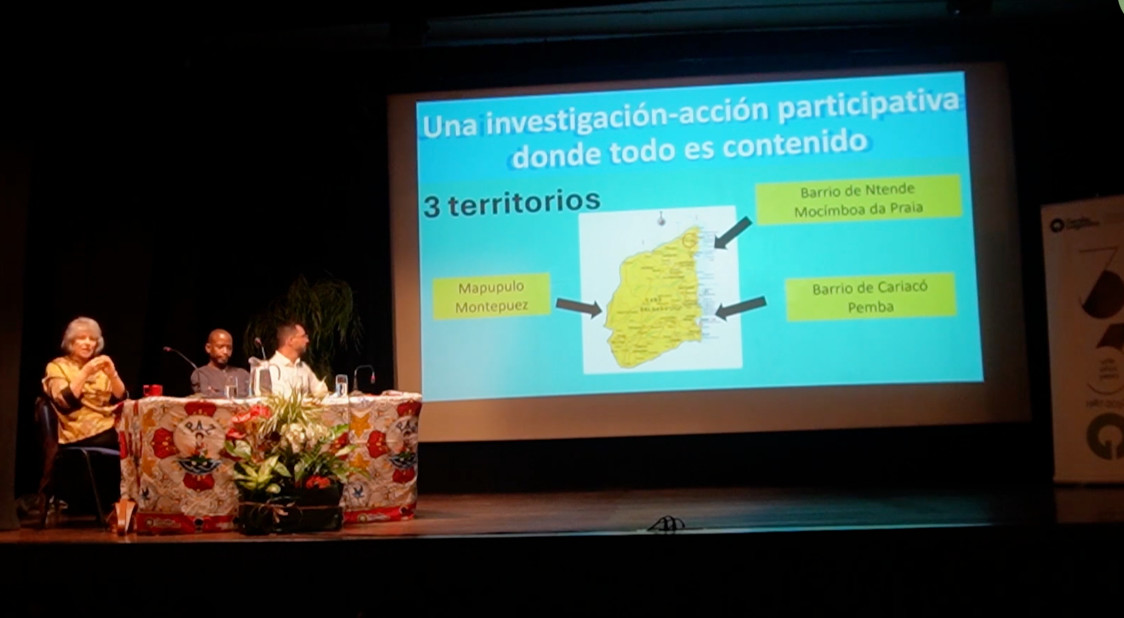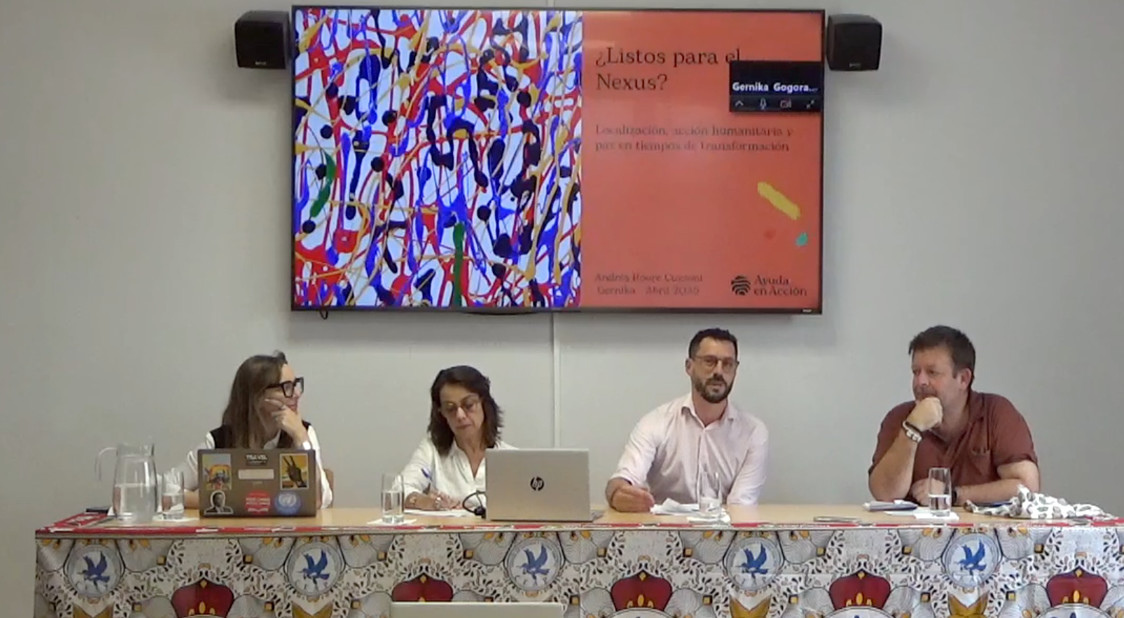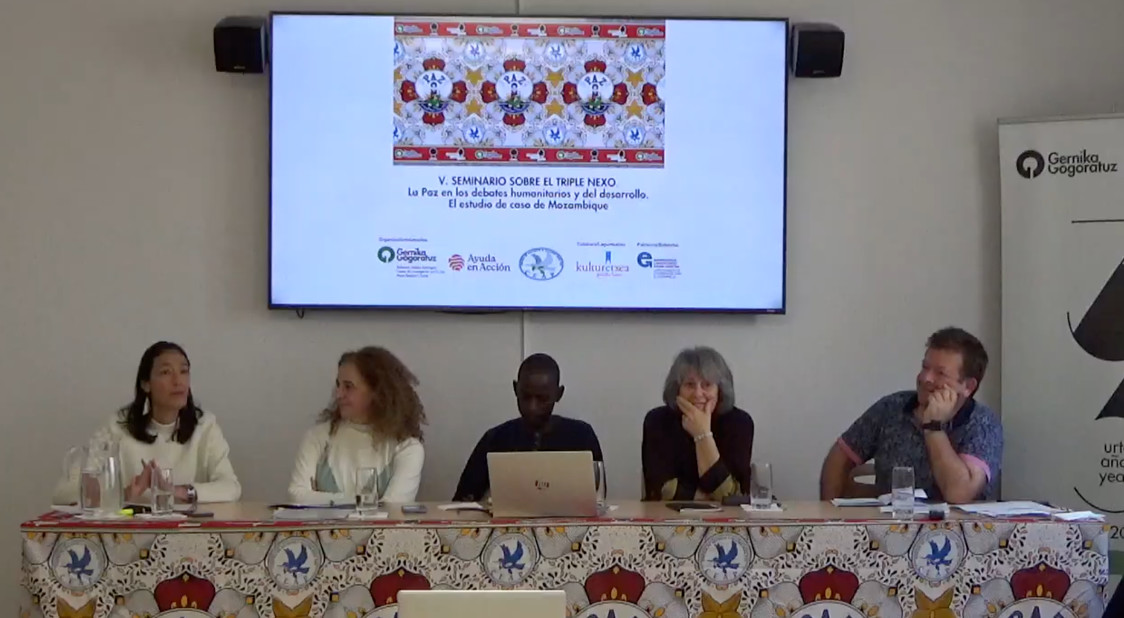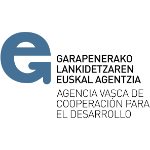
The Triple Nexus approach
Connecting humanitarian action, development
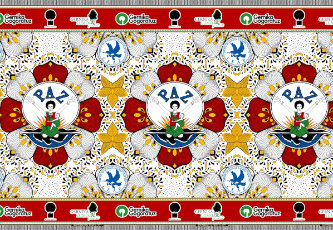
TRIPLE NÉXUS PERMANENT SEMINAR
The Triple Nexus permanent seminar strengthens local capacities for community action research in the humanitarian, development and peacebuilding fields through training, theoretical seminars and practical studies in Cabo Delgado, northern Mozambique, which incorporate a local, feminist and decolonial perspective into the theoretical and practical debates of government authorities and the international community on the application of the triple nexus in the context of African conflicts.
Gernika Gogoratuz contributes its knowledge in peace studies; Ayuda en Acción Mozambique contributes its experience in humanitarian aid and development in the province of Cabo Delgado; and the Centre for Peace Studies and Action (CEAP) is the link to the local reality, with communities and their proposals for humanitarian action, development and peacebuilding.
This project is funded by eLankidetza – Basque Agency for Development Cooperation.
ÍNDEX
SCHEDULE
I SEMINAR. ‘Conceptualisation of the Triple Nexus: A Critical Approach’.
II SEMINAR. ‘Africa-Basque Country: Rethinking Humanitarian Action, Development Cooperation and Peacebuilding.’
III SEMINAR. ‘International NGOs and the Dilemmas of the Triple Nexus.’
IV SEMINAR. ‘Peace in the Triple Nexus.’
V SEMINAR. ‘Peace in Humanitarian and Development Debates: The Case Study of Mozambique.’
CASE STUDY
Triple Nexus from the communities of northern Mozambique (Cabo Delgado).
Connecting humanitarian action, development and peacebuilding to strengthen the local agenda in Cabo Delgado, Mozambique.
Created by:
Gernika Gogoratuz. Peace Research Centre.
Ayuda en Acción Mozambique.
THE TRIPLE NEXUS SEMINAR SERIES (2023–2025)
PRESENTATIONS
SECTION 1. CONCEPTUALISATION OF THE TRIPLE NEXUS
SECTION 2. LOCATION OF THE TRIPLE NEXUS
SECTION 3. OPERATIONALISATION OF THE TRIPLE NEXUS
SECTION 4. PEACE IN THE TRIPLE NEXUS
SECTION 5. THE TRIPLE NEXUS IN CABO DELGADO
SECTION 6. CONCLUSIONS OF THE PERMANENT TRIPLE NEXUS SEMINAR
SCHEDULE
I SEMINAR.
‘Conceptualisation of the Triple Nexus: A Critical Approach’.
Viernes, 1 de diciembre de 2023. Universidad de Deusto. Bilbao.
Programa:
9:30 -10:00
Saludo de Bienvenida y presentación de la iniciativa.
Gorka Urrutia (Director del Instituto de Derechos Humanos Pedro Arrupe de la Universidad de Deusto)
Jokin Alberdi (Gernika Gogoratuz, HEGOA-UPV/EHU)
PONENCIAS MARCO
10:00 -10:30
“Definiciones, enfoques y dilemas del triple nexo”.
Francesco Michelle (Oficial de análisis e incidencia del Clúster Global de Protección de ACNUR)
10:30 – 11:00
“Buenas prácticas de triple nexo en el África occidental: La experiencia de Intermon/Oxfam”
Lourdes Benavides (Intermón-Oxfam) – Presentación Online
11:00 – 11:30
“Los derechos de las mujeres y la construcción de paz en Casamance, Senegal”.
Seynabou Male Cissé, activista Senegalesa. Premio Ignacio Ellacuría de cooperación para el desarrollo 2023.
Presenta: Gustavo de la Orden. (Investigador del NOHA – U.Deusto)
11:30 – 12:00
Debate con el público
II SEMINAR.
‘Africa-Basque Country: Rethinking Humanitarian Action, Development Cooperation and Peacebuilding.’
Lunes, 8 de abril de 2024. Bizkaia Aretoa. ehuGune. Bilbao.
Programa:
15:30 -15:40
Saludo de Bienvenida y presentación de la jornada María Oianguren y Jokin Alberdi (Gernika Gogoratuz)
PONENCIAS-MARCO
15:40 – 16:00
Localización de la acción humanitaria, el desarrollo y la construcción de paz. Una mirada desde los agentes de cooperación.
Ivan Camilo Vargas (Cáritas-Colombia)
16:00 – 16:20
De la Paz Liberal a la Paz Militar: ¿Es posible otro modelo de construcción de paz en la República Democrática del Congo?
Marta Iñiguez de Heredia (GEA/UAM)
16:20 – 17:00
Valoraciones y propuestas de las mujeres congoleñas para la acción humanitaria, el desarrollo y la construcción de paz.
Justine Masika (SFVS-RDC)
DIÁLOGOS HORIZONTALES
Espacio para el debate y socialización de experiencias, dudas o cuestiones planteadas por ONGDs vascas que trabajan en África.
17:00-17:30
ALBOAN y su trabajo en RDC. Loreto Martínez.
Asociación FAMEK de mujeres congoleñas en Euskadi. Marie Lucia Monsheneke.
Asociación Manuel Iradier y su trabajo en RDC. Lucho Royero Farmamundi y su trabajo en RDC. Begoña Areitio.
ACCP y su trabajo en Níger con la Asociación Diko. Toussaint Degueno.
Mundubat y su trabajo en Sáhara. Mónica Alonso.
17:30-18:30
Intercambio entre ponentes y personas asistentes.
Modera: Jokin Alberdi (Gernika Gogoratuz)
III SEMINAR.
‘International NGOs and the Dilemmas of the Triple Nexus.’
Viernes 13 de septiembre 2024. Gernika
PROGRAMA
09:30-10.00:
Bienvenida e inicio de la jornada: Jokin Alberdi (Gernika Gogoratuz)
DESAFIOS DE LA OPERATIVIZACIÓN DEL TRIPLE NEXO
10.00-10.30:
“El nexo en los actuales marcos internacionales de cooperación”. Cristina Churruca (IDH, NOHA-Universidad de Deusto)
10.30-11.00
“Cuando no hay opción sin daño: Acción humanitaria en contextos de guerra” Alejandro Pozo (Investigador sobre conflictos armados y acción humanitaria)
11.00-11.30
“Metodologías para el triple nexo: propuestas de combinación del ciclo del proyecto, el Enfoque del Marco Lógico, y la acción sin daño” Alfredo Langa, (IECAH)
11.30-12.00
“La práctica del Triple Nexo desde las ONG internacionales”. Jesus Pérez Marty (Ayuda en Acción)
12.00-12.30h: pintxo-café
12:30-13.30h:
DIÁLOGOS HORIZONTALES
Presenta y dinamiza: Liliana Zambrano (Gernika Gogoratuz)
SESIÓN DE TARDE
15.30 – 16.15.
“Retos en la aplicación de un enfoque de triple nexo en construcción” Paco Rey (Instituto de Estudios Sobre Conflictos y Acción Humanitaria-IECAH).
16.15 – 17.30.
Experiencias prácticas:
«Retos sobre el triple nexo en Cabo Delgado (Mozambique)» Josep Escoda/Jaime Abad (AeA-Mozambique) y Alberto Ernesto. (Centro de Estudios de Acción para la Paz – CEAP)
«Aprendizajes sobre cómo integrar la “sensibilidad al conflicto” en un programa con enfoque de triple nexo en la frontera Níger-Chad» Amelie Gauthier Campbell (Intermon/Oxfam)
«La experiencia de Médicos sin Fronteras y el Triple Nexo». Aitor Zabalgogeakoa (Médicos Sin Fronteras – MsF)
17.30 – 18.30.
Diálogos Horizontales
Presenta y dinamiza: María Oianguren (Gernika Gogoratuz)
18:30:
Cierre de la jornada: Jokin Alberdi (Gernika Gogoratuz)

IV SEMINAR.
‘Peace in the Triple Nexus.’
Lunes 10 de febrero 2025. (HEGOA-UPV/EHU) Basoko Etxea, Lehendakari Agirre, 89, Campus Sarriko, Bilbao
PROGRAMA
SESIÓN MAÑANA.
9.00-9.30h.
Bienvenida y Presentación. Irantzu Mendia (HEGOA UPV/EHU)
9.30-10.00h.
Ponencia de enmarque:
- El dilema de la paz en el triple nexo: Desafíos y oportunidades para el enfoque humanitario-desarrollo-paz. Rodrigo Mena Fluhmann, (ISS/Erasmus University Rotterdam)
10.00-11.30h.
Bloque 1: La práctica de la paz en el Triple Nexo: Modera: María Oianguren (Gernika Gogoratuz)
- Resistencias decoloniales a las operaciones internacionales de mantenimiento de la paz: El caso de la República Democrática del Congo. Judith Jordà i Frias (CES-Universidad de Coimbra)
- Construcción de paz y tradición en el Triple Nexo: El Caso de Uganda. Victor González Clota (CEAi UB)
- Claves para repensar la Cooperación descentralizada y construcción para la paz: Kristian Herbolzheimer (Director ICIP-Catalunya)
Diálogos horizontales. Ponencia de Enmarque y Bloque 1.
11.30-12.00h.
Pausa Café
12.00-12.45h.
Bloque 2: Experiencias de construcción de paz comunitarias y de ONG en contextos humanitarios y de conflicto armado:
Modera: Jokin Alberdi (Hegoa UPV/EHU; Gernika Gogoratuz)
- Intercambios de experiencias de mujeres y construcción local para la paz entre Colombia, Senegal y Níger
- Seynabou Mbaye Gueye, COSEF-Conseil Sénégalais des Femmes
- Issoufou Soumana y Haoua Bonkano (DIKO-Níger)
- Luz Piedad Caicedo (Corporación Humana-Colombia)
12.45-13.15h.
Bloque 3:Triple Nexo, más allá de contextos de conflicto armado y posconflicto:
Modera: Jokin Alberdi (Hegoa UPV/EHU; Gernika Gogoratuz)
- ¿Se puede ampliar la construcción de paz y el enfoque de triple nexo a los casos de violencias urbanas? Tica Font (Centro Delàs)
- El enfoque de “triple nexo” en la crisis migratoria venezolana. Andrés Gómez (IECAH)
13.15-14.00.
Diálogos horizontales de los Bloques 2 y 3.
SESIÓN TARDE.
15.30-16.30h.
Ponencias-marco:
Modera. Liliana Zambrano-Quintero (Gernika Gogoratuz/Universidad de Deusto)
- Del doble al triple nexo: del “No hacer daño” al “hacer bien”. Karlos Pérez de Armiño (HEGOA, UPV-EHU)
- Una reflexión feminista y decolonial de la paz en el triple nexo. Paula Duarte Lopes (CES/ Universidad de Coímbra)
16.30-17.15
Trabajo en Grupos: Dinamizadores
Liliana Zambrano-Quintero (Gernika Gogoratuz/Universidad de Deusto)
Jokin Alberdi (Hegoa-UPV/EHU y Gernika Gogoratuz)
María Oianguren (Gernika Gogoratuz)
2-3 preguntas: ¿Qué se entiende por paz? El enfoque de triple nexo ¿está contribuyendo a la construcción de paz?;¿Cómo trabajar la paz en contextos de crisis humanitaria y conflicto armado? ¿Cómo incorporar la paz en las intervenciones humanitarias y en los proyectos de cooperación?
17.15-18.00.
Plenario: Puesta en común y cierre. María Oianguren (Gernika Gogoratuz); Liliana Zambrano (Gernika Gogoratuz y Universidad de Deusto) y Jokin Alberdi (Hegoa-UPV/EHU y Gernika Gogoratuz).

V SEMINAR.
Miércoles y jueves, 23 y 24 de abril 2025. Gernika-Lumo.
‘Peace in Humanitarian and Development Debates: The Case Study of Mozambique.’
PROGRAMA
23 DE ABRIL, MIÉRCOLES, TARDE
Sala Lumo. Kulturetxea (Gernika-Lumo)
16:00-18:00
Presenta: Luisa del Pinho Valle. Investigadora del Centro de Estudios Sociales. Universidad de Coimbra.
16:15-16:45
Debates sobre la localización, la acción humanitaria y la construcción de paz.
·Andrés Rouré. Director de Fundación Ayuda en Acción, Mozambique.
16:45-17:15
Crítica al triple nexo del humanitarismo neoliberal: Explorando alternativas.
·Daniela Nascimento. Investigadora del Centro de Estudios Sociales (CES). Universidad de Coímbra.
17:15-18:00.
Diálogos horizontales.
·Jokin Alberdi Bidaguren. Profesor de la UPV/EHU. Gernika Gogoratuz.
24 DE ABRIL, JUEVES, MAÑANA
XXXV JORNADAS INTERNACIONALES DE CULTURA Y PAZ DE GERNIKA
Lugar: Elai Alai Aretoa (Gernika-Lumo)
9:30-13:00 LA ARTICULACIÓN DEL TRIPLE NEXO Y EL ESTUDIO DE CASO DEL NORTE DE
MOZAMBIQUE
Presenta: Andrés Rouré. Director de la Fundación Ayuda en Acción en Mozambique.
9:45-10.30: Conflictos africanos y desafíos del Triple Nexo.
·Josep María Royo e Ivan Navarro. Investigadores de la Escola Cultura de Pau. Universitat de Barcelona.
10:30-11:00: Comprendiendo las dimensiones de género de las protestas postelectorales en Mozambique.
·Aventina Matusse. Investigadora del Centro de Estudios y Acciones para la Paz – CEAP (Mozambique). 11:00-11:30 Análisis del conflicto armado y la construcción de paz en Cabo Delgado.
·Jokin Alberdi Bidaguren. Profesor de la UPV/EHU. Gernika Gogoratuz.
11:30-12:00 Diálogos horizontales
12:00-12:30 PAUSA
12:30-13:15 Resultados de la investigación acción participativa del proyecto Triple Nexo en las Comunidades de Cabo Delgado.
·Teresa Cunha. Investigadora de Gernika Gogoratuz y del Centro de Estudios Sociales en la Universidad de Coimbra.
·Alberto Ernesto. Investigador del Centro de Estudios y Acción para la Paz (CEAP) y Fundación Ayuda en Acción en Mozambique.
24 DE ABRIL, JUEVES, TARDE
Sala Lumo. Kultur Etxea (Gernika-Lumo)
16.00-18.00
Conclusiones del Estudio de caso en el Norte de Mozambique y del Seminario Permanente de Triple Nexo.
16.00-17.00
Discusión sobre el estudio de caso 3N. Norte de Mozambique
Presenta: Jokin Alberdi Bidaguren. Profesor de la UPV/EHU. Gernika Gogoratuz
17.00-18.00
Conclusiones del Seminario Permanente de 3N
·Itziar Ruíz-Giménez. Investigadora del Grupo de Estudios Africanos y la Universidad Autónoma de Madrid (UAM).
·Liliana Zambrano Quintero. Investigadora de Gernika Gogoratuz. Universidad de Deusto.
·Jokin Alberdi Bidaguren. Profesor de la UPV/EHU. Gernika Gogoratuz.

